#it inspired me to get into filmmaking
Text
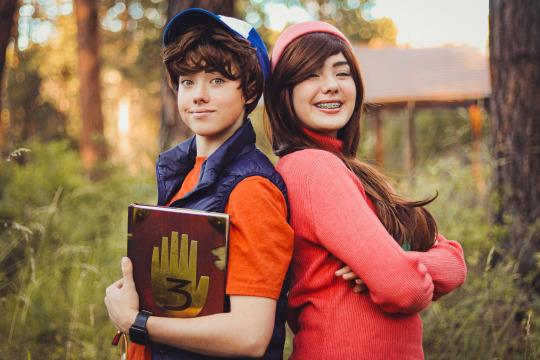
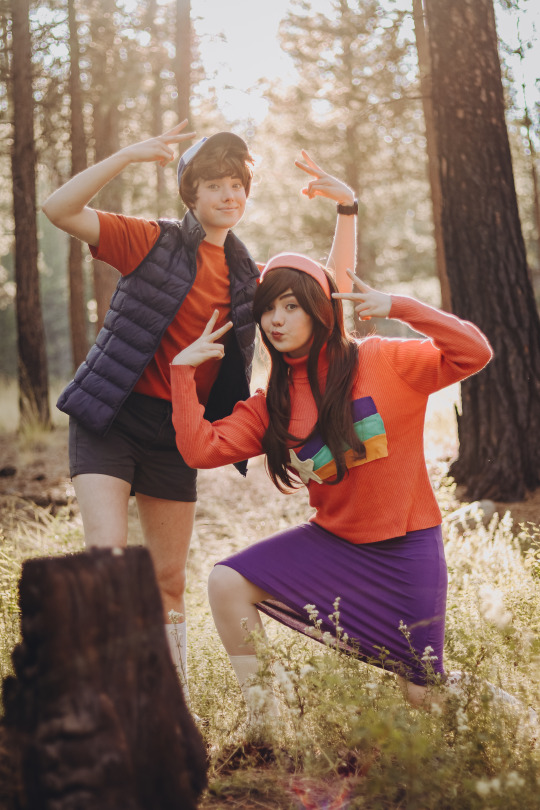
Somewhere in the woods... waiting.
I rarely post cosplay photos here, but with the Gravity Falls fandom breathing a bit of fresh life from the 10th anniversary, I thought I'd make an exception!
This show means so much to me, I can hardly put it into words. From the endless laughter with my family to dropping everything to drive into the unknown in search of a statue, Gravity Falls has truly changed my life.
Although my sister and I are more of a Stan and Ford duo, we couldn't resist cosplaying the kids!
Dipper is me
Mabel is my sister
#gravity falls#gf#dipper pines#dipper#mabel pines#mabel#dipper cosplay#dipper pines cosplay#mabel cosplay#mabel pines cosplay#gravity falls cosplay#10 years of gravity falls#cosplay#journal 3#special edition journal 3#journal 3 special edition#so many memories#I can't believe it's been 10 years#I truly don't know where I'd be without this show#it inspired me to get into filmmaking#which is my career now#and getting to be a part of the Cipher Hunt#is something I'll NEVER forget#it's kind of the highlight of my entire life so far#and it has been for years#I don't see that changing anytime soon#I just love this show so much
48 notes
·
View notes
Text
I can't believe THIS
Is from the same BDG that gave us "Because if a hedgehog could commune with the dead, be resurrected, run with infinite energy and have his gospel PROPHESY THE FUTURE, THEN EITHER SONIC IS A GOD, OR COULD KILL GOD, AND I DO NOT CARE IF THERE IS A DIFFERENCE"
#it fucking slaps dude dont get me wrong#bdg#brian david gilbert#dudes a genuinely talented musician its insane#and filmmaker hes a huge inspiration im ngl#fucking dances moving? that shit almost made me cry#me.txt#Spotify
5 notes
·
View notes
Text
Bulgarian Music in Studio Ghibli films
”Myth has it that Orpheus was born in what is now Bulgaria. It seemed to be fact, not myth, that his daughters are still singing there”
These words were written by the New York Times in the remote 1963 — the year in which the largest Bulgarian folk ensemble crossed the Iron Curtain to conquer an entire continent with its cosmic art.
The 1975 release of Le Mystère des Voix Bulgares, a compilation album of modern arrangements of Bulgarian folk songs, further popularized Bulgarian music, and in 1977, a vinyl record featuring the folk song “Izlel ye Delyo Haydutin” (Eng: Come out rebel Delyo) began its journey aboard the Voyager 1 and Voyager 2 spacecrafts.
From this point on popularity from the West spread to the East, and Bulgarian folk music made it to the entertainment industry, including legendary Japanese anime films, like the cult cyberpunk “Ghost in the Shell” or the heartwarming Studio Ghibli features.
In this short article I write about two occasions of Bulgarian music playing in Studio Ghibli’s films.
The record that inspired the creation of “Only Yesterday”
“Only Yesterday” is a 1991 Japanese animated drama film written and directed by Isao Takahata, based on the 1982 manga of the same title by Hotaru Okamoto and Yuko Tone. Set in rural Japan, the film draws parallels with the peasant lifestyle present in Eastern Europe.
The original work is a compilation of short stories about 11-year-old Taeko’s daily life in 1966. Director Takahata had a hard time making it into a movie since the manga, told in the form of a memoir, has no plot to hold a feature. Together with producer Toshio Suzuki, they came up with the solution of bringing the narrator of the story, adult Taeko, into the movie. But there is a curious anecdote about how this idea came to mind.
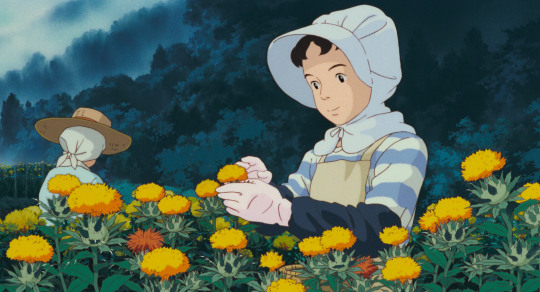
Taeko picks safflower as the Bulgarian song “Malka moma dvori mete” plays in the background. © Studio Ghibli
In a 2021 interview with students from Sofia University St. Kliment Ohridski, producer Suzuki recounts how a record of Bulgarian songs performed by the children choir “Bodra Smyana”, introduced to him by director Takahata, inspired the creation of the movie. Moved by the cosmic voices of the children, they decided to make “Only Yesterday” a musical. He also recalls what a tiring process it was to acquire the rights to the music, but if you’ve seen the movie, I am sure you will agree that it was worth it; the haunting, beautiful songs with the pastoral images of farmers picking flowers contribute to one of the greatest scenes created in cinema.

Producer Suzuki showing the record that inspired the creation of ”Only Yesterday”. Source: Studio Ghibli’s Twitter
In “Only Yesterday”, we can hear two songs from the album Bulgarian Polyphony I by Philip Koutev Ensemble. The upbeat “Dilmano Dilbero” [Eng. beautiful Dilmana] sets a happy mood as the protagonist gets changed and ready to go on the field. As the scene shifts and Taeko starts narrating a sad story about the girls in the past picking safflower with their bare hands, the song and mood shift as well.
While the first song has a fast rhythm, with lyrics about pepper planting that can also be interpreted figuratively, the second one, “Malka Moma Dvori Mete” [Eng., a little girl sweeps the yard], is a ballad about a young girl who is forced into marriage but has never known true love.
Both compositions sing about life-cycle events like marriage and the regular coming of the harvests, with lyrics perfectly fitting the setting and plot of the movie, which makes me wonder if the filmmakers chose them by chance or if they had someone translate the words.
Bulgarian Cosmic Voices Enchanting Howl
“Howl’s Moving Castle” is a 2004 Japanese animated fantasy film written and directed by Hayao Miyazaki, loosely based on the 1986 novel of the same name by British author Diana Wynne Jones. Set in a fictional kingdom the movie draws inspiration from various places in Europe. One of them being Bulgaria.
The story focuses on a young girl, named Sophie, magically transformed into an old woman, and a self-confident but emotionally unstable young wizard, Howl, living in a magical moving castle.
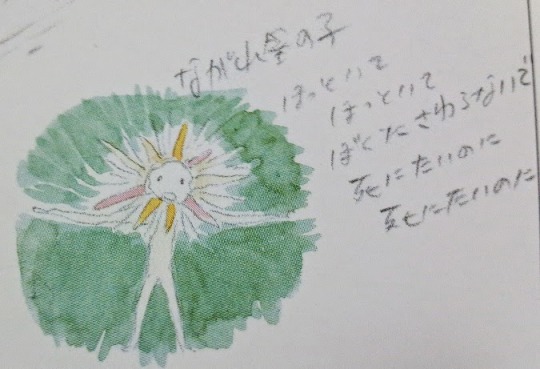
A sketch of a Star Child. Source: The Art of Howl’s Moving Castle
If you’ve seen the movie, you surely remember the scene when Madame Suliman ambushes Howl and tries to strip him of his magic powers. Star Children encircle him and his companions; their shadows grow big, dark and intimidating. They start dancing and chanting unintelligible magic words and are almost successful in their devilish act.
This scene, together with the music played in the background, have been a favourite of many fans of the film. Some even recount it giving them nightmares when they were children.
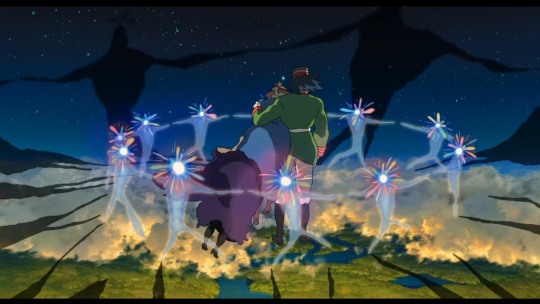
Star Children encircle Howl in an attempt to strip him of his magic powers. © Studio Ghibli
It turns out, however, that these aren’t any incantations, but the lyrics of a folk song. In Bulgarian. And a love song! Contrary to popular belief, the lyrics have nothing to do with magic and are actually about a boy taking his sweetheart, Dona, to the market to buy her new clothes. The excerpt used in the movie is very short and a bit altered from the original, but the words used go like this: Trendafilcheto, kalafercheto, Done mamino, translated as “the rose, the costmary, my darling Dona”.
I am planing a follow up article where I will post the translated lyrics together with a brief explanation on how they are related to the movies.
If you want to comment on or add something, I would love to hear!
Source
#studio ghibli#only yesterday#howls moving castle#Le Mystère des Voix Bulgares#bulgarian folklore#bulgaria#toshio suzuki#hayao miyazaki#isao takahata#bulgarian music in ghibli films#the boy and the heron#スタジオジブリ#ブルガリア#おもひでぽろぽろ#ハウルの動く城#宮崎駿#高畑勲#鈴木敏夫#bulgarian music
605 notes
·
View notes
Text
I Saw Wish

And it was the worst animated Disney movie I’ve ever seen. I have to watch it again before I can get into the nitty gritty details. But I don’t need details to sum it up, because my dad actually said it perfectly as we left the theater:
“It was like someone who didn’t really understand Disney movies tried to make a Disney movie.”
Both the form (the technical arts of filmmaking) and the content (the morals, values, and themes of the movie) were totally horrible.
I don’t know who’s fault it was. Jeremy Spears was in the storyboard room and Mark Henn and Eric Goldberg did some 2D animation. But they must have gotten outvoted, or they must not care anymore.
Because holy cow. Here’s some stuff that’s just off the top of my head.
SPOILERS. Not that it matters, because nothing interesting happens in this movie.
The writing? Terrible. Ninety percent of it feels like the characters are filling time with quirky one-liners that are trying too hard to be appealing, then failing, then taking you out of the movie. The jokes aren’t funny. The characters just respond to each other in conversation to check a one-liner box. The other twenty percent is whole conversations repeating tell-don’t-show exposition that has already been covered, usually twice, in previous scenes. Like if in Tangled, every scene had included some variation of Rapunzel saying to friends and enemies alike, “I have to see the floating lights so I’m sneaking to the castle with this thief who wants a mysterious tiara I hid from him. Don’t tell my mother, she’s a bit overprotective!” Over. And over. And over.
The character motivations are way too broad. Asha? Her dream is just “that everybody around me gets to be happy.” That’s it, in a nutshell. No deeper exploration of that. Nobody asks, “why do you care so much?” Nobody tries to convince her she should look out for herself, and then she proves she was right all along. The King? We are told (not shown) that he doesn’t want anyone else’s dreams to be “destroyed.” But he in no believable way expresses that that motivation is still what’s driving him during the movie—what’s driving him is just a plain old lust for power, no nuance.
By the way, the whole premise of the movie? Undercooked. Half-baked concepts strung together with no definitive meaning. Therefore, it’s not believable. Example: The characters act like the wishes are beautiful—well, actually, no, this movie doesn’t know how to show, so there’s not a lot of meaningful acting—the characters just tell us that wishes are “the most beautiful part of someone,” and that’s why it’s worth going through this adventure to give their wishes back to them. But there’s no proof of that in the movie. In fact, it directly kicks it’s own legs out from under that idea, because it has every character who gives up their wish forget that part of themselves. Asha’s grandfather has forgotten his wish, but that doesn’t make him any less “beautiful.” She, and everyone, still treats him like he’s this wonderful old man who deserves the world, who everyone loves…but why is he so appealing? If he “gave up the most beautiful part of him?” The only character who is changed by their lack-of-wish is the Sleepy-analogue character…who is just sleepy, which is described as “boring.” But nobody else who’s given up their wish in the whole kingdom acts like that. It’s just him. Also, the King acts like it’s so important to protect the wishes from destruction. But what does destroying a wish look like? That actually happens to Asha’s mom. Her wish-bubble is broken, literally, and she just says she feels grief. But like. Why? She never remembered it in the first place; it had been missing from her life for years. Also, what the heck is a wish?! It seems to range from broad concepts like “inspire people” to “fly.” Just “fly,” like a bird. The desire to levitate off the ground is the most important, beautiful essence of one background character. Like, what?! But no character ever has the why behind their wish to make us care.
I could go on and on about that point. Like, think about Disney movies that wrote the book on how to make movies about characters with wishes. If Ariel were in Wish, her bubble would look like “dancing and learning and exploring on the Surface with someone who understands her.” But we believe that that is her real, genuine wish, and that it matters to her, because we are shown why being understood is so important to her. Because it’s missing from her life. There’s a scene where she explores a boat alone, and even her best friend doesn’t get excited about it with her. Her dad won’t listen to her point of view. Her siblings don’t ask her about her life even when they think she’s in love. She wants what she wants because of pieces of her life that we are shown.
We are never shown why Asha’s grandfather is obsessed with inspiring people, so we have no reason to believe it, or care whether he gets it or not. We can’t feel disappointed when his wish is said to “never come true,” like we did when Quasimodo was abused by the people he wished to join. We can’t feel elated when he finally “gets” his wish, like we did when Simba smiles on Pride Rock remembering the same way he used to as a cub and claims the crown with a roar. We don’t have anything to hang on to, nothing to relate to, nothing to grasp and feel with the characters. So we don’t feel, because they didn’t put the work in to help us feel. They just say, “the mom’s feeling grief. Feel grief.” And expect us to do the work ourselves. I have to stop harping on this point and move on.
But The main point of the movie is very broad because of that lazy premise, and it’s barely reinforced by any kind of appealing storytelling. If I had to guess, the point would be “Keep wishing for more even when it’s hard.” But the story they told to communicate that meaning was so unimpactful. Asha doesn’t have a dream of her own that’s such hard work to accomplish! (Neither does her grandfather; his wish is “to inspire people.” And at the end, we’re supposed to see him strumming a guitar and believe it’s inspiring? We were never shown how he worked hard to learn how to play the instrument. Or that he carved it with his own hands, or anything like that. So there’s no meaningful demonstration of working hard for it or achieving your wish even if it’s far out of reach.) And nobody except the king is trying to take wishes away from anyone, and he just does it literally, after they voluntarily give them to him, so there’s not even any impactful demonstration of “don’t let anyone tell you your wishes are dumb or unachievable, or stop you from reaching them.” Even when he takes them away, it’s just because they…could, someday, be used to threaten his kingdom in a vague, really unlikely way. There are so many things you could do with “keep wishing for more even when it’s hard.” For instance; you could say the main character has always been afraid to dream (wish for more), because maybe when she was a kid something wonderful almost happened but ended in tragedy, so she keeps her head down and doesn’t want much because if you don’t dream you’ll never be disappointed. She takes no risks, and has to learn that sometimes trying and failing is worth more than slogging through life all self-protective. I mean, the pieces were right there. She has this line about her dad, and how she wished he would get better but then he died. She has lines about how nobody should have to live with grief?? Then that’s never addressed again! It’s just a throwaway emotion-moment with no buildup or follow-through to tie it to and support that main theme.
The compositions of too many shots were so terrible. Characters got cut off in weird places. One shot has Asha dead center, with her grandfather on the left side of the table and her mother on the right, having a family dinner with a super exposition-heavy conversation that is meant to be emotionally charged. But despite everything else being perfectly centered, half of her mother’s body is chopped off. The movie’s shot like someone’s mom who doesn’t understand technology tried to take a video with her phone.
The charm of the art “style” wears off basically immediately. I know what they were going for. I see the sketch lines and watercolor textures. This is maybe the first time Disney ever failed to accomplish a visual “look” that turned out good. Everything looks dull. Muted. De-saturated. Slightly out of focus, but not in a cool Spider-Verse way. The sets or backgrounds are lazy; at no point does the scenery look complete; big, empty, boring spaces that do not create any kind of “stage” for impactful moments. The rendering looks unfinished. When Asha’s hair moves during her belting of the “I Make This Wish” song, it’s bad. It’s unnatural. It flops in a way that doesn’t make sense for the weight of her hair. The most impactful visual moments come from the villain, and they’re moments when he looks way too unhinged for the kind of line he’s saying.
There is no interesting character development. Asha goes from believing everyone is basically good and their wishes deserve the chance to come true , to….that, again. That would be fine, she could be a static character, if she proved contrast-characters wrong, in a believable way. But she never does. Because no other characters argue with her except the King. And it goes no deeper than “everyone’s wishes are basically good and they deserve the chance to make them true” vs. “nuh-uh, because I get to decide what makes them deserving.” The King doesn’t have any kind of interesting development, either. They don’t expand on his tragic backstory—it consists of one drawing of him near a broken boat, and a few images of the corner burned off of his family taoestry. They never say “King Magnifico wished for _____ and it was taken away!” They literally never tell you what his wish or dreams were, or what motivated him to create the whole kingdom that the movie’s premise sits on. So there’s no convincing sense of progression, how he got this way, why he’ll keep going “so far.”
The pacing is weird. It undercuts every moment that could have any kind of emotion behind it. One minute Valentino is suavely bouncing around, then he’s given a two-second beat to blubber with badly-animated tears that he’ll miss Star—then he instantly gets to have another funny one-liner so we forget he might’ve been sad a second ago. We’re clearly supposed to believe that the King and his wife are devoted to each other, and his turning evil was such a big betrayal, but there’s no time and no impactful evidence for us to believe either of those things. And even if we did, the moment he’s defeated and trapped in a mirror, and begs to be let free, the Queen kind of shrugs it off, makes a forgettable one-liner, and tells them to throw him in the dungeon. And he doesn’t look remorseful. And we don’t even get to assume he’s embarrassed or emotionally devastated that he’s come to this—because the last thing he says is “nooo, the dungeon is so smellyyy!” Like this is a half-baked LEGO short that can’t get emotionally deeper than what an actual 3 year-old’s parents might be okay with.
And that’s the worst offense: The movie is not genuine. It works hard for nothing, and it has no vulnerability. It just uses old Disney standbys to pretend to be vulnerable. Have the music swell and the characters gasp and the songs drip emotion when characters are meant to be saying or doing something emotional.
But truthfully, think of all the Disney movies you’ve ever seen with the hardest emotional moments. The sheer joy of Genie when he realizes he’s free. The anguish when Elsa thinks Anna’s been frozen forever, or when Anna thinks she’s dead. The trauma when Simba loses Mufasa. The longing and dreaming of Ariel when she reaches up out of her grotto. The sense of foreboding when Mother Gothel says “fine, now I’m the bad guy” or the heartbreak in Rapunzel’s eyes when she thinks Flynn has abandoned her, or the shame on Aladdin’s face when Jafar reveals he’s a street-rat, or the horror of cruelty when the stepsisters rip up Cinderella’s dress, or Kala’s tears when Tarzan leaves her in the treehouse, or Sarabi’s tears when Simba comes back, or Mulan’s father tossing aside the sword and token of the Emperor to embrace Mulan, or heck, even just Lilo pushing Stitch in the woods and telling him “get out of here.” This movie has no moments like that. It has moments you can tell that the filmmakers wanted to hit like that—but they don’t.
Because no work is put into building them up. You know how much Simba loves Mufasa, because you’ve been watching their chemistry more than any other character all the way up till he dies. You know how much Mulan wants to please her family because she spends all of Act I desperately attempting to do that. You know Quasimodo believes the world below is beautiful and wants them to accept him because he has interesting things like—talking to gargoyles, convincing us that he’s lonely; building a scale model of the townspeople, convincing us that he sees them in a beautiful way and wishes he were beautiful in more ways than one like them, too.
Right down to the facial expressions, none of them are as anguished, happy, sad, excited, silly, in any convincing way like all of Disney’s other movies. Asha’s “low moment” when she’s afraid her “wish” hurt everyone else (still vague on what that wish ever was) lasts two seconds, she’s not crying, she’s barely sitting with slumped shoulders, and her family barely spend two seconds comforting her. They basically just say, “aw, no, it’s not y fault, it’s the king’s.” And she’s like, “yeah okay” and that’s that. It’s like the animators we’re afraid to animate really intimate emotions on the characters’ faces. The voice actors, too.
And the whole movie is peppered with Easter eggs to past Disney movies. But all that does, if you really know Disney beyond the visuals, is make you think of how hollow this movie is in comparison. How much you wish you were watching Cinderella or The Little Mermaid or something with depth and vulnerability instead of Wish.
#I’ll talk more in an organized fashion later#wish#disney’s wish#wish Disney#wish 2023#critique#spoilers
537 notes
·
View notes
Text
Oh my god, season 2 is The Tales of Crowley Hoffmann
I guess this has to be a series now too. Part 1 l Part 2
When Aziraphale wants to perform a show-stopping magic trick in S2E4, he is shown the "Professor's Nightmare," a rope trick, and references "Prof Hoff himself" at the end of the minisode.
Because we love double meanings so much around here, I decided to actually watch the Powell & Pressburger epic opera film "The Tales of Hoffmann," assuming it was the another P&P easter egg and the other Hoffmann (not the magician) that was being referenced.
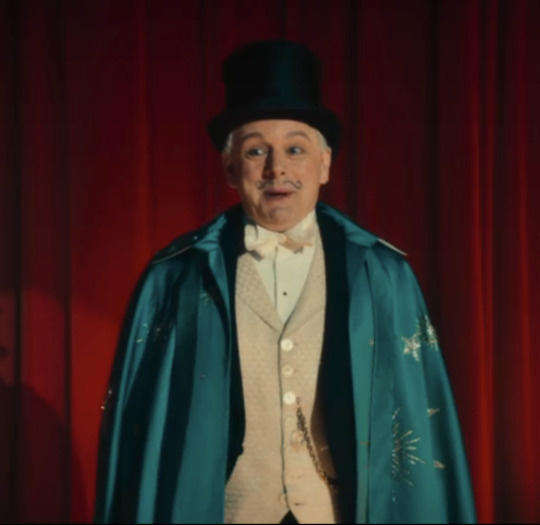
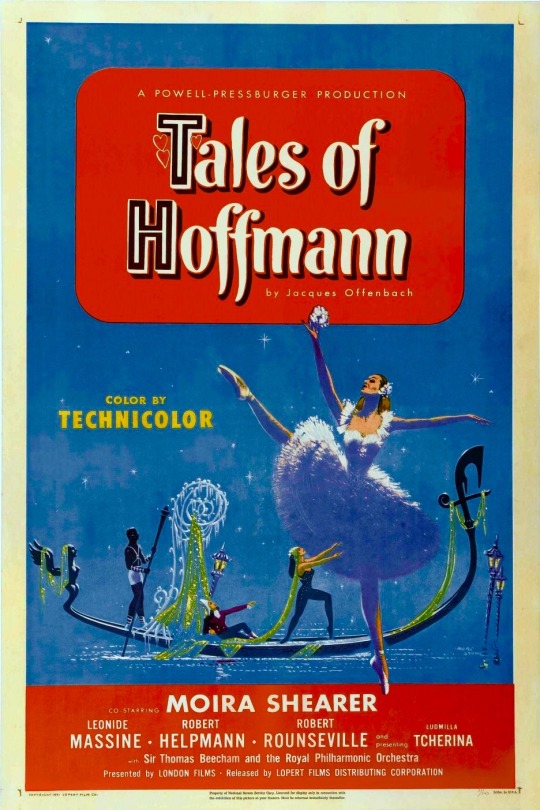
One, this movie is unhinged. Two, this season IS The Tales of Hoffmann. Allow me to explain...
There are shot for shot quotes literally everywhere throughout the season.
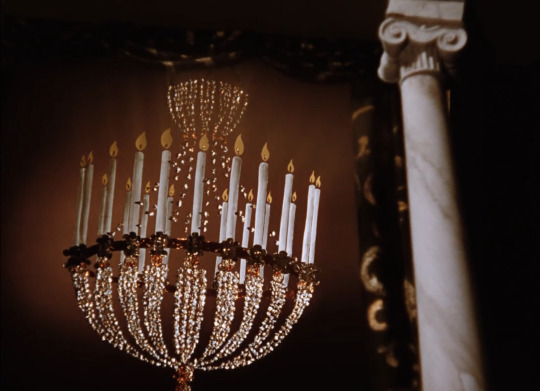

P&P The Tales of Hoffmann (Automaton Ball) & Good Omens Season 2 "The Ball"
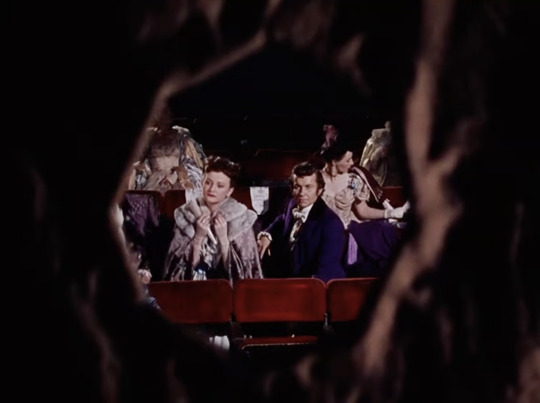
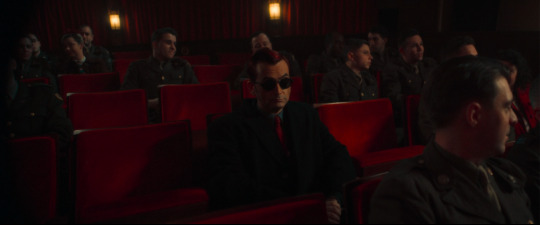
P&P The Tales of Hoffmann (Hoffmann watches Stella perform) & Good Omens Season 2 "The one with the zombies"
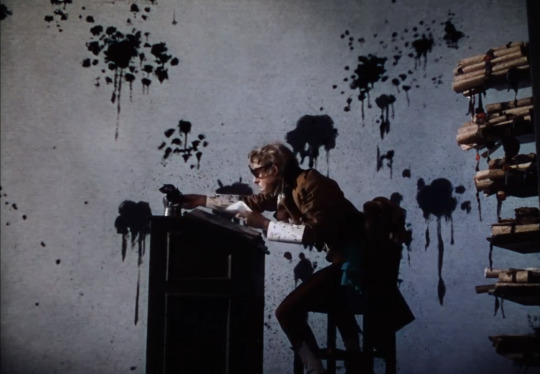
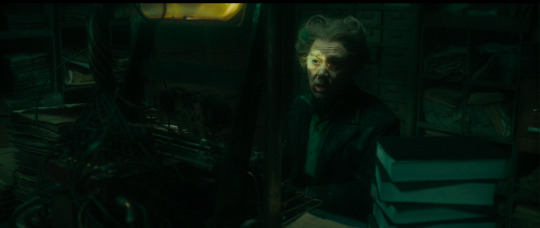
P&P The Tales of Hoffmann (Clerk in Automaton Ball) & Good Omens Season 2 "The Ball"
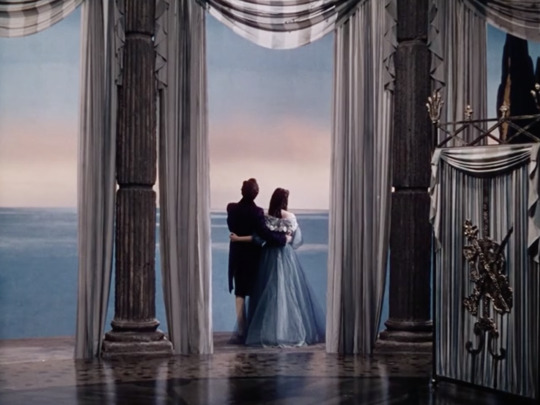

P&P The Tales of Hoffmann (Tale of Antonia, Hoffman & Antonia) & Good Omens Season 2 "The Clue Crowley & Aziraphale"
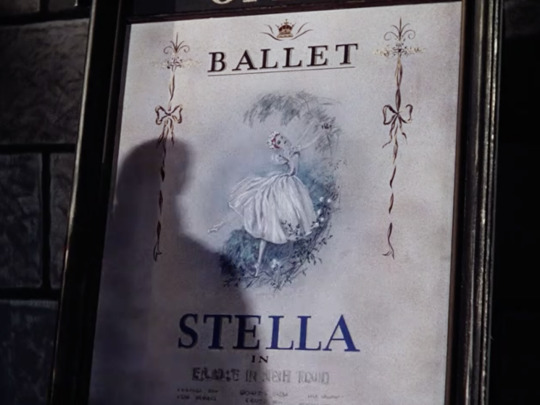
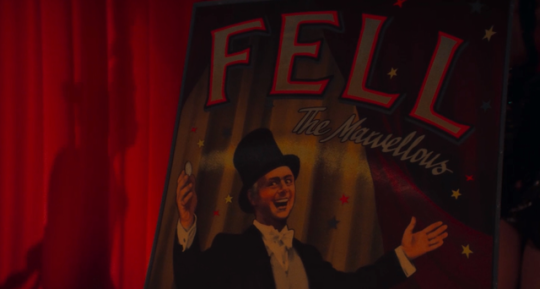
P&P The Tales of Hoffmann (Prologue) & Good Omens Season 2 "The one with the Zombies"
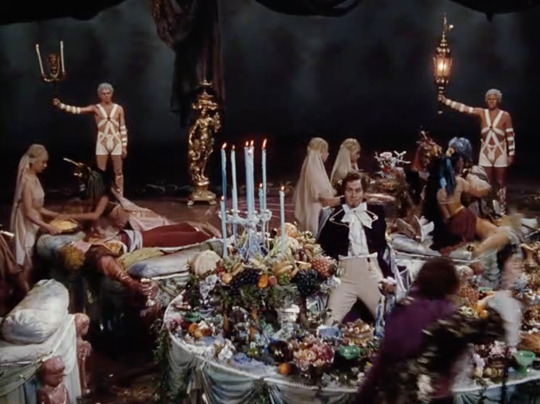

P&P The Tales of Hoffmann (Tale of Giulietta Banquet scene) & Good Omens Season 2 "The Clue Banquet scene"
*By the way Hoffmann wears a goatee for this tale

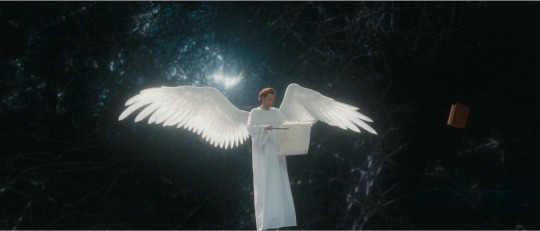
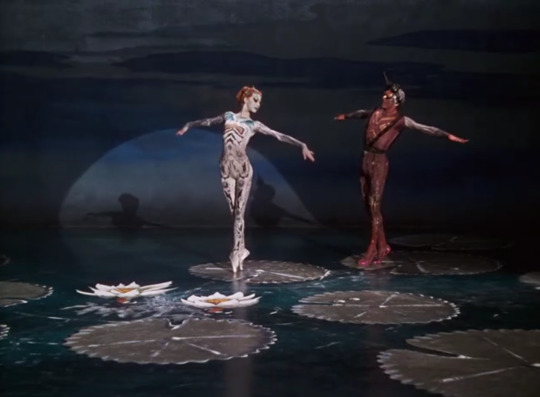
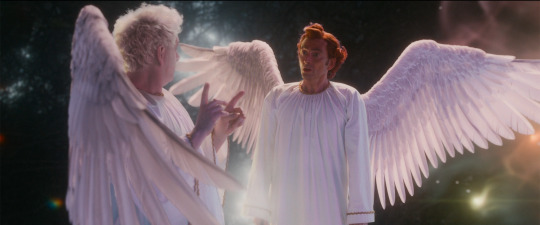
P&P The Tales of Hoffmann (Prologue "Dragonfly dance") & Good Omens Season 2 Prologue "Before the Beginning"
*This is Stella and un unknown devil drangonfly, NOT Hoffmann
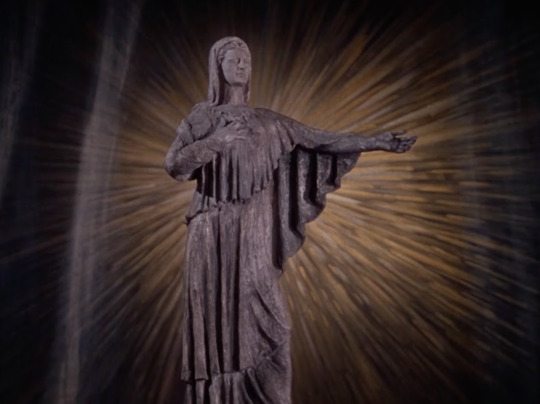
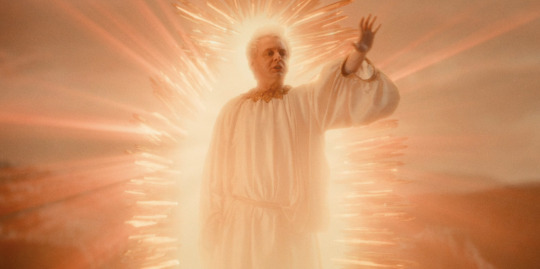
P&P The Tales of Hoffmann (Tale of Antonia) & Good Omens Season 2 "The Clue"


P&P The Tales of Hoffmann (Tale of Antonia) & Good Omens Season 2 "The one with the Zombies"
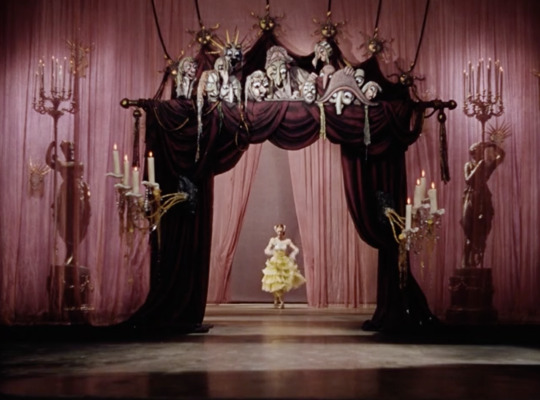
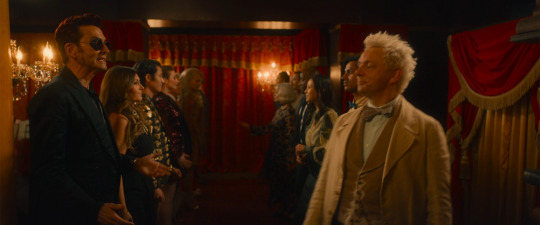
P&P The Tales of Hoffmann (Automaton Ball) & Good Omens Season 2 "The Ball"

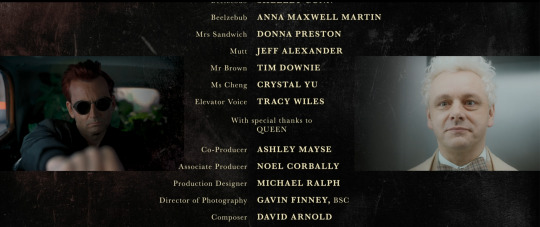
P&P The Tales of Hoffmann (End credits through Hoffman's glasses) & Good Omens Season 2 end credit scene.

Stella & Aziraphale. This one makes me laugh.
There are SO MANY MORE, but tumblr has an image limit. Seriously, it's nuts.
2. It seems simple and straightforward, but it's not at all
" Why would ambitious filmmakers simply film an opera? Many admirers of the work of Michael Powell and Emeric Pressburger have assumed that their decision to make The Tales of Hoffmann (...) was in some way an admission(...) that they couldn’t go on making their edgy, over-the-top melodramas after the rejection and interference they’d suffered (but) there’s a case for considering The Tales of Hoffmann as one of the finest and boldest works that Powell and Pressburger produced, so far ahead of its time as a wholly “composed” film, combining visual and musical elements, that it has still not been fully appreciated... Late in his life, Powell himself said that he thought it was one of the best films that he and Pressburger had made.
What makes the film so remarkable is a series of paradoxes: the fact that it virtually reinvented the freedom and fantasy of silent cinema while making full use of Technicolor and a stellar cast of dancers and singers..." - Criterion, The lives of marionettes
3. The structure of the story is the same as the show
Here is the story of the Movie** (Not really the Opera that inspired it)
In the prologue, we see the dance of the dragonflies onstage at a ballet.
Count Lindoff (very bad dude) is spying on both the principal dancer Stella, and the audience member Hoffmann (who's admiring her). Lindoff is behind the scenery. During her dance, Stella passes a love note to her assistant for Hoffmann. The bad dude intercepts it out of jealousy. During the intermission, Hoffmann goes down to the tavern next door, watched by his sort of buddy in red, Nicklaus. People ask him to tell stories to while away the time, and so he tells 3 stories (actually four but we'll get back to that).
We launch into 3 tales/minisodes in other times and places :
1. The Tale of the Ball of the Automaton where he falls in love with a robot. He is humiliated.
2. The tale of Venice (Giulietta) where he falls in love with a courtesan/double agent who crosses him.
3. The tale of Antonia, where he falls in love with a girl who feels trapped by her living dad, her dead mom and a mysterious bad dude (Lindoff). She is murdered in a ring of fire, but becomes a ghost and is resurrected and sent back to earth.
At the end, we snap back to the tavern in the real world. Hoffmann reveals that these three women are all metaphors for how he feels about Stella, his true love. He's drunk and depressed now, thinking she never sent for him after the show. Stella arrives in the tavern looking for Hoffmann, ready to run away, but now accompanied by Lindoff (dressed as an angelic figure) who followed her. She looks to Hoffmann to save her, but he's too blinded by the fact that he doesn't think she loves him back to pick up on the signal. He gives up, and she goes back up the stairs guided by Lindoff. Her assistant (who was bribed by Lindoff at the beginning) is given the go ahead by Lindoff to go back to the tavern and taker over. They close the door to the tavern, while she walks up ethereal stairs with the bad dude. THE END.
The one story that doesn't fit into the minisodes and is told in the real world is Kleinzach. We understand by the end of this one that this is Hoffmann's self loathing about never being good enough for Stella, because Stella is perfect and Hoffmann is ugly and deformed. The main love interest attempts to steal Kleinzach's essence through a mirror by the end.
4. Powell & Pressburger recast four actors in new roles
In The Tales of Hoffmann, P&P decided to recast four of the principal actors/dancers from the film The Red Shoes in new roles, wanting to recreate the magic that they brought to the first ballet film. Sound familiar?
5. Crowley is Hoffmann

"The Tales of Hoffmann" original 1881 costume concept for Hoffmann & Crowley costume sketch for S2E3 1827 Edinburgh.
Glasses are a really important aspect for Hoffmann in both the opera and the movie versions of The Tales of Hoffmann. Hoffmann is gifted metaphorical magic glasses that he wears to be able to perceive his love in a way they aren't really in real life. In the opera, he wears dark glasses to shut out the real world, not just as a metaphor. Check out a modern day version of the opera's Hoffmann costume :
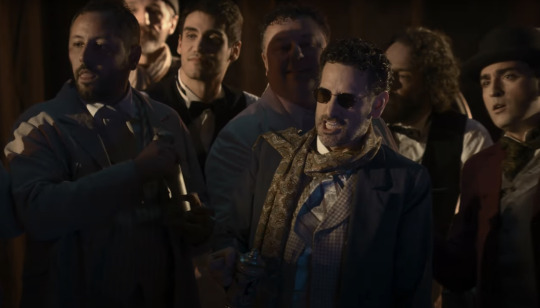
He's french and slamming a beer but you get it.
Crowley also canonically loves watching movies. It would make so much sense that his minisode recountings with him and Aziraphale would resemble different styles of movie that he loves. Seeing as we see him drive away at the end as the last character, an argument could be made for him being the ultimate narrator of the story in season 2.
6. The original American release of The Tales of Hoffman had 14ish minutes cut out of it by the studio.
So we all know by now that whole debacle about having the clocks jump 14-15ish minutes during the kiss?
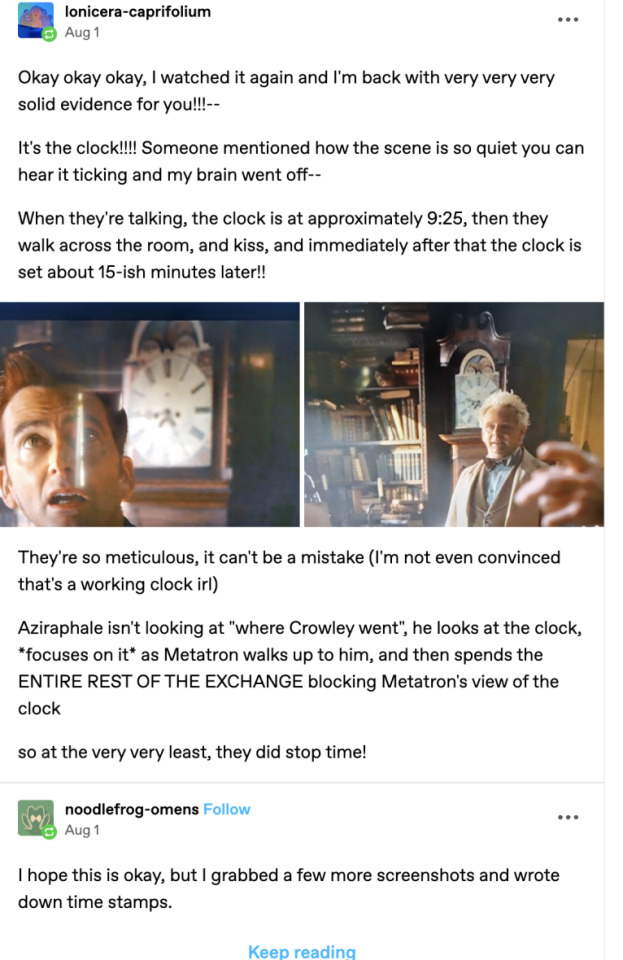
"The Tales of Hoffmann found an audience far wider than expected, despite Korda’s misgivings about the movie’s running time and his decision to cut 14 minutes out of the film for its American release." - Criterion, The Tales of Hoffman
I have been unable to unearth what the difference between the American & British versions of the P&P Tales of Hoffmann is, if you know let ME know. I want to know!
_____________________________________
And I HAVE SO MUCH MORE. This is long enough already so I'll save the more detailed stuff for a new post.
**The opera is a whole other beast. You can read about it here, but basically there's a lot more going on in the opera because the composer died before finishing it, and multiple versions exist after the original uncompleted score got lost IN A FIRE. Anyway.
Here's part 2
#good omens meta#good omens season two#art director talks good omens#go season 2#good omens 2#go meta#good omens season 2#go2#crowley x aziraphale#anthony j crowley#aziraphale and crowley#aziraphale x crowley#crowley and aziraphale
512 notes
·
View notes
Text
I haven't seen any posts about this yet but l've seen some fan art that makes me feel this needs to be said:
Don't forget Leah Sava Jeffries has darker skin when making Annabeth Chase fan art!
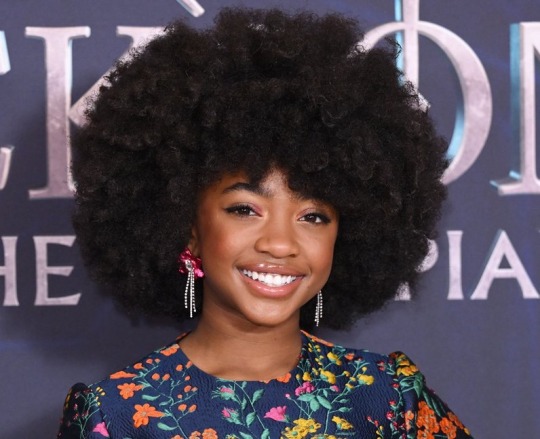
She is much closer to Lupita Nyong'o than Zoe Kravitz when it comes to shading, reflection, and complementary color usage :).
Lighting for dark skin is different on light skin. Light skin gets changed by lighting, and dark skin reflects the lighting. Below is a lovely shot of Nyong'o's character from Wakanda Forever in mourning. The filmmakers emphasize the umber qualities of her skin in contrast to the funereal white and (arguably harsh) light across her shoulder below.
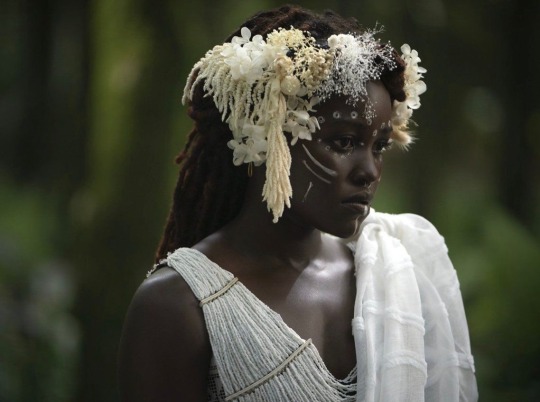
Try to pick spots that aren't directly in or near the light, and try mixing 3 or more! You can put it into a color mixer online, or even color pick, lower the opacity, and lay the shades over each other until you find one that fits. And of course, the more 'realistic' you want to go with shading and lighting, the more shades you're going to want to be able to explore vivaciously :D.
Let's take a look at the same 3 beautiful actresses I mentioned at the beginning, with a bad color picked area and a better-ish color picked area. (Please keep in mind, these are not perfect comparisons, as I was not able to find pictures of all 3 actresses under the same kind of lighting.)
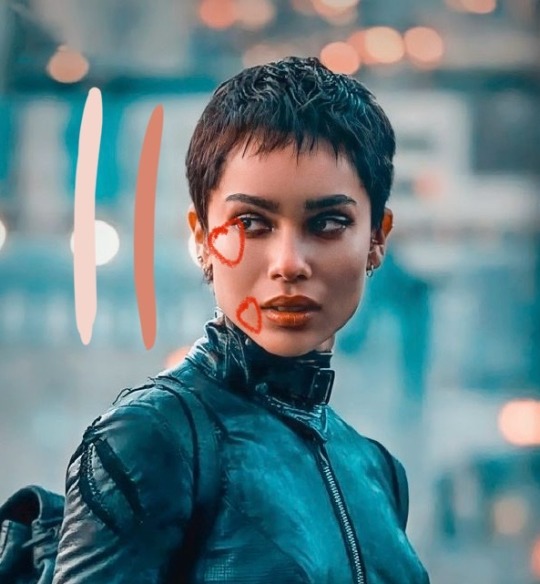
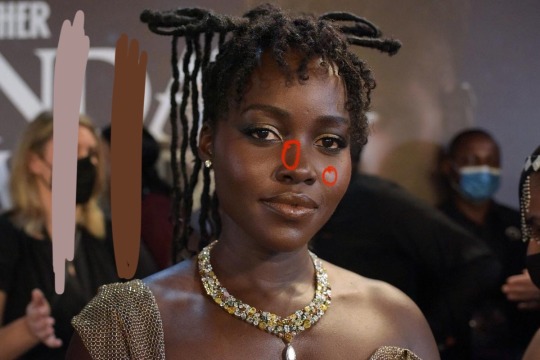
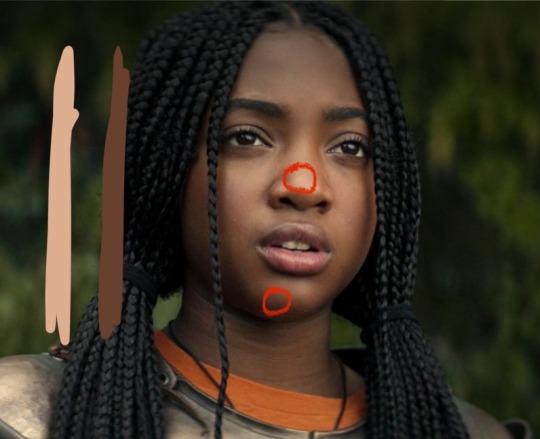
Kravitz's has a clear difference between the two, but they aren't too far apart, in comparison to Nyong’o’s and Jeffries’s. Note the dullness in the poorly picked shades as opposed to the better ones. Also keep in mind that while Kravitz has a rosy undertone (at least in that picture - it’s from The Batman, which has stylized coloring) Nyong’o has a slight cool undertone (I can’t pin down quite what, but the picture is definitely not stylized like Kravitz’s).
Jeffries runs more ochre or russet, but neither of those are pink. They are more red than terracotta or umber, but to call Jeffries’s face rosy would be wrong. Err more towards the golden when drawing her.
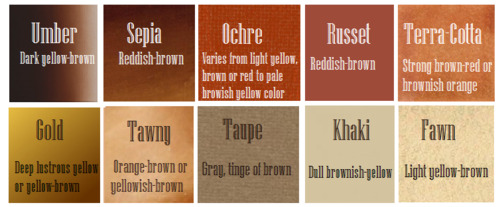
^^saved an image from a writing tutorial long ago, but can’t seem to find it. If someone recognizes it, I’ll link it.
EDIT: it’s from this post. Thanks @autumnrowancollector ! <3
And also, the darker skin gets, the less likely warm undertones are going to appear. Don't be afraid to use blue or purple or even green on occasion!
Additionally, cool lighting on dark skin is always a win imo.
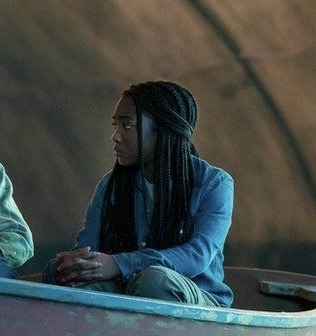
(I was going to use that picture of Jeffries as Annabeth by the lightning bolt, but then I realized the lighting on her face doesn’t quite match up with where it should hit from that angle, and I realized they kind of just turned everything bluer, so screenshot time!)
(Also if you want another really great live action example, check out anything Aldis Hodge is in, like Leverage and Black Adam)(and of course there’s Spiderverse <3 but I want to post pictures of Hodge)
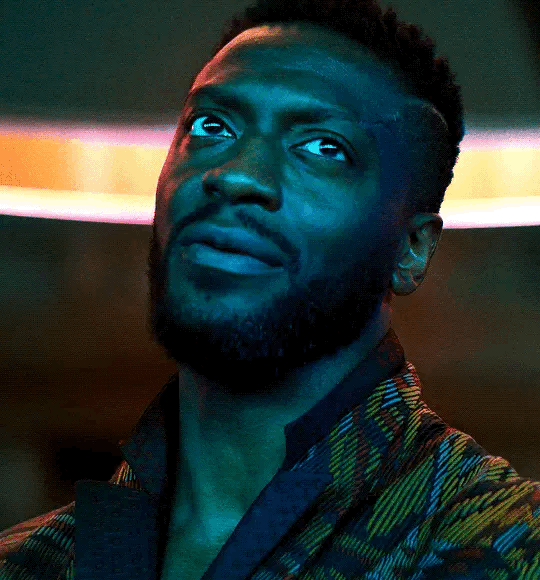
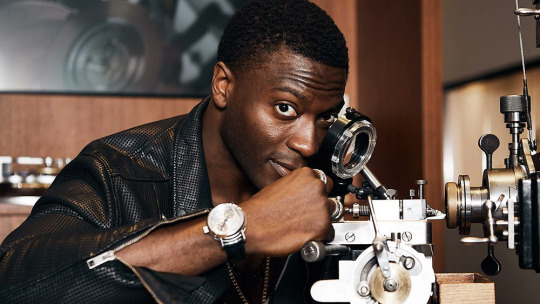
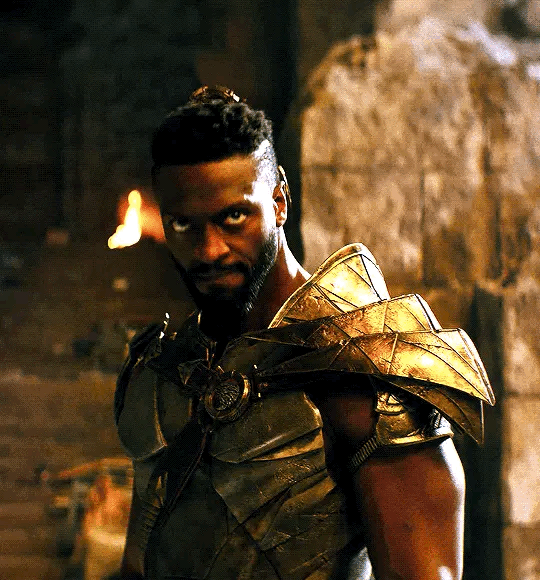
Now, to here’s a list of more experienced people’s advice:
Black facial features & hair
Shading digitally for a (somewhat) monotone Black character
Stylistic choices and places to start looking for inspiration (besides a search engine).
Coloring Black people’s lips
A better coloration tutorial
Also a nice tutorial for Indigenous skin tones, just in case yall want to draw Piper or use this information for other dark skinned characters :).
EDIT: Some actresses who are closer in skintone to use for Annabeth, provided by the lovely @blackfemmecharacterdependency ! If you can’t find a reference for Jeffries in a specific lighting, maybe check out these ladies’ pictures! It’s a reblog, so scroll down.
TLDR: Don’t make Annabeth pink and pale, make her dark and golden.
#Annabeth chase#Percy Jackson#percabeth#leah sava jeffries#pjo#leah jeffries#art tutorial#percy jackon and the olympians#I love superheroes and so of course all of the actors I thought of were from superhero movies lmao#also for the record my advice is mostly from reading others’ tutorials and observation#and I don’t really use it a lot because I stick to lineart a lot lol#like down to mentioning Hodge (love himmmm) as a reference for good lighting on dark skin#there’s another post floating around here that specifically mentions him and Leverage for that#I’m tagging this as an art tutorial but really i want it to be more of a master post#master post so yall can see the tutorials I usually use#but then I ended up writing about Jeffries specifically because I’m dumb#I wanted to go to sleep four hours ago I’m dumb#I really want to draw her and ginger Percy but#irl it’s starting to get busy at school again :/
355 notes
·
View notes
Text
6 Things I Learned from the Lisa Frankenstein Commentary

We don’t get movies like Lisa Franeknstein often, which is a shame because it’s endlessly charming yet delightfully twisted. While it disappointed at the box office, it has "cult classic" written all over it.
The coming-of-age horror-comedy is out today on Blu-ray and DVD. Among the special features is an audio commentary by Zelda Williams. Here are 6 things I learned…
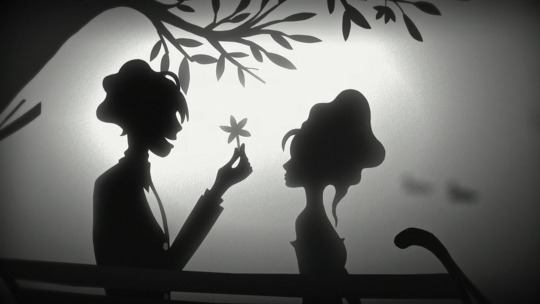
1. Catch Me If You Can inspired the opening credit sequence.
The opening credit sequence, which briefly depicts the Creature's love story from his previous life in the style of Victorian shadow box art, was inspired by Catch Me If You Can.
"We wanted to do something interesting with the credits in this bit. I was really inspired by Catch Me If You Can, which I thought the opening credits were particularly interesting and helped establish the story before we ever got to it. And because Creature doesn't speak this whole movie, I wanted an opportunity to show what his life would have been like."

2. The film was originally intended to be rated R.
Although Lisa Frankenstein pushes the PG-13 rating as far as it can go, it was originally intended to be a hard R. Williams cites the party scene, in which Lisa originally smoked a laced joint rather than drinking a PCP cocktail, as a difficult revision.
"This is where stuff got a little complicated when we were going from R-rated to PG-13. Originally there was a coated joint they were passing around. This is one of the only scenes that I'm not sure I'm as fond of in comparison to the joint stuff. Most of the rest of the changes were fine, but this one I find very strange. It's just a very different reaction and interaction than what used to be there. However, these are the things that happen when making a movie."

3. Creature is an homage to Day of the Dead's Bub.
Not only Lisa is seen watching George A. Romero's Day of the Dead in the film, but the Creature is an homage to its iconic zombie, Bub.
"Creature for me is definitely an homage to Buster Keaton, but he's also an homage to the zombie you just saw on screen, Bub, who was in Day of the Dead, a Romero movie that I'm very fond of. It was an incredibly emotive and a very intelligent zombie and ended up getting revenge against the asshole in the movie. It was one of my favorite monsters ever made, so when I could put that on screen during the movie, it made me very happy."
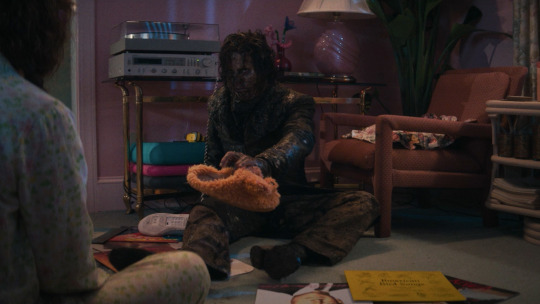
4. Zelda hid a tribute to her father, Robin Williams.
Williams is the daughter of Robin Williams, and she included his 1983 comedy album, Throbbing Python of Love, among the records scattered on the floor in Lisa's living room.
"Oh, there's Dad! We used one of Dad's vinyl albums because we had to scatter some across the floor." She refers to it as "a little, mini Easter Egg for me."
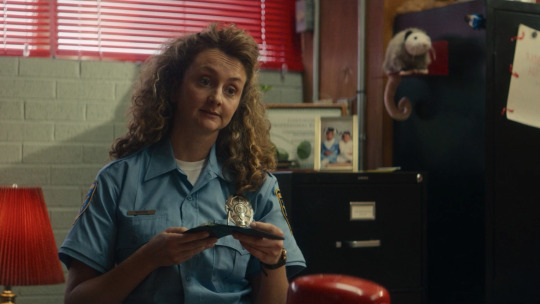
5. The police officers are named after John Waters.
The police officers in the film are Officer John (played by Walker Babington) and Officer Waters (Sylvia Grace Crim) — named on a whim in honor of cult filmmaker, John Waters.
"They asked me to name the cops, because obviously they needed to have name tags, so I named them Officer John and Officer Waters." She thought no one would notice since they're so small, but a viewer pointed it out at a test screening.
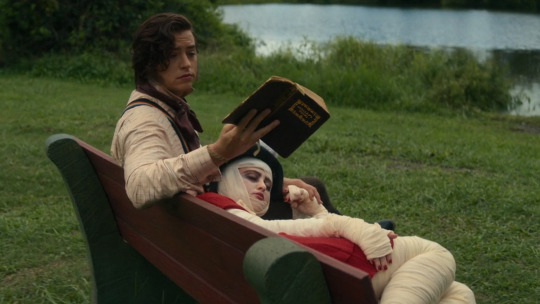
6. The film is sprinkled with movie references.
Williams wore her influences on her sleeve with her directorial debut, and she pointed out several references on the commentary:
A Trip to the Moon (clip featured in Lisa's surreal dream sequence)
The Cabinet of Dr. Caligari (stylistic inspiration on the dream sequence)
Weird Science (the party scene)
Suspiria (red lighting during drug sequence)
My Boyfriend's Back (camera shot from inside a grave looking up at characters)
Kill Bill (weapon point-of-view shot)
E.T. (a boy on a bike — played by Diablo Cody's son — at the end)
Notting Hill (reading together on a bench at the end)
Lisa Frankenstein is available now on Blu-ray, DVD, and Digital via Universal.
#lisa frankenstein#zelda williams#diablo cody#kathryn newton#cole sprouse#article#review#dvd#gift#liza soberano#henry eikenberry#joe chrest#carla gugino#horror#horror comedy
167 notes
·
View notes
Note
Hi Mike, how was Tribeca?
It was fantastic.
For those who don't know, I was lucky enough to be invited to sit on the US Narrative Feature Jury at this year's Tribeca Festival. I just got back yesterday from ten days in Manhattan.
I found the whole thing to be absolutely rejuvenating.

Our category had five jurors: myself, Zoey Deutsch, Stephanie Hsu, Tommy Oliver, and Ramin Bahrani.

Kate was also on a jury - she was on the International Feature Jury (which included Brendan Fraser and Zazie Beets) so that meant we spent the week seeing different movies. We'd pass each other on our way to different screenings, sometimes in the lobby of the theater, and then meet up for dinner or a party and get to tell each other about the awesome movies we saw that day.
It was overwhelming to start with. At the Opening Night reception, we met Robert DeNiro, and we saw Martin Scorcese and Matt Damon (we were way too timid to introduce ourselves). I did manage to introduce myself to Kenneth Lonergan, who has made some of my all-time favorite movies (You Can Count on Me is one of the best movies I've ever seen), and the great Chazz Palminteri (I got to tell him how much I absolute adore A Bronx Tale). I also spent a fair amount of time chatting with Peter Coyote, who was incredibly kind and funny. We chatted a lot about Ken Burns.

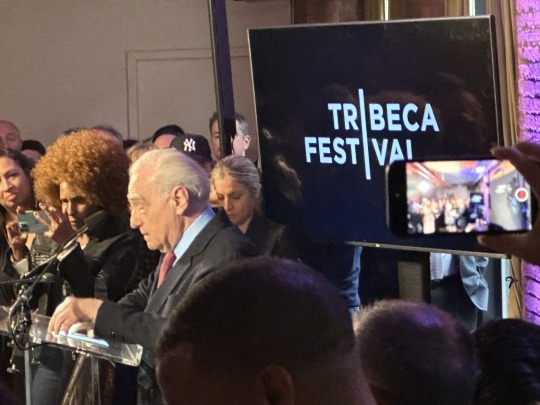


After that, we went to the Opening Night film, a terrific documentary called Kiss the Future. We walked the red carpet (something I'm never quite comfortable with, but luckily Kate is a natural) and we saw the movie with a packed house. It was a beautiful film and really started everything off on an amazing foot.

And then the judging started. I got to watch all of the movies in my category in the theater, with audiences. A car would pick me up and take me to the screening. At my busiest, I saw three movies in one day, but it was usually two.
I made it a point not to know anything about the movies before I saw them - sometimes I went in without knowing the title. And I can't overstate how amazing it was to see these independent films with an audience, in a theater, instead of streaming. Having spent the better part of the last five years watching this primarily at home, I was shocked at how inspiring and energizing it was to sit in a theater with a crowd over, and over, and over again. I've never seen this many movies in a theater in such a short time, and I LOVED it.
I didn't only see movies that were in my category, though. I also made sure I saw other films at the festival that I wasn't judging - including Downtown Owl, the directorial debut of my friends Hamish Linklater and Lily Rabe.
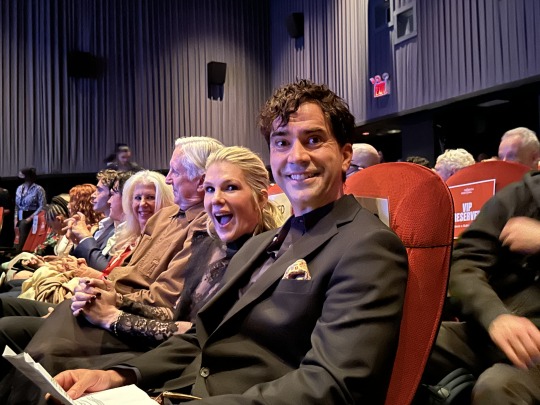

I made a point to go to the premiere of Suitable Flesh, starring the amazing Barbara Crampton and Heather Graham, and produced by my old friends Joe Wicker and Morgan Peter Brown from the Absentia Days.

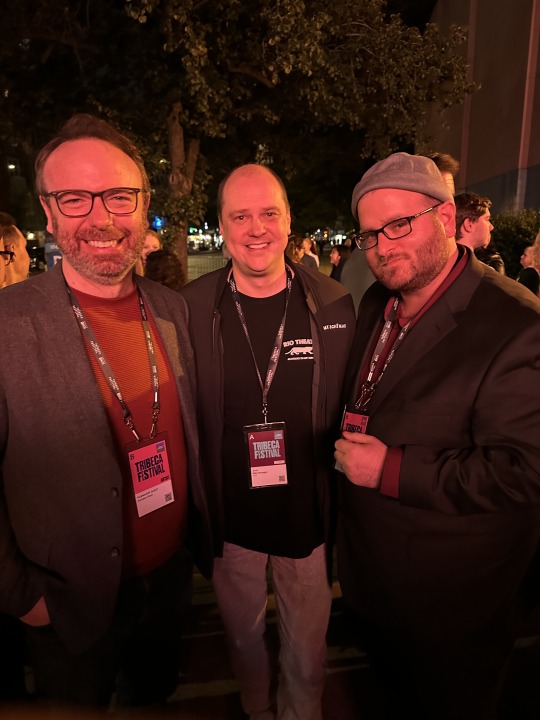
And it wasn't all movies, either - I also got to moderate a chat with the brilliant Sam Lake about his upcoming Alan Wake 2 release. Sam was a joy to spend time with, and we had a lot to talk about.
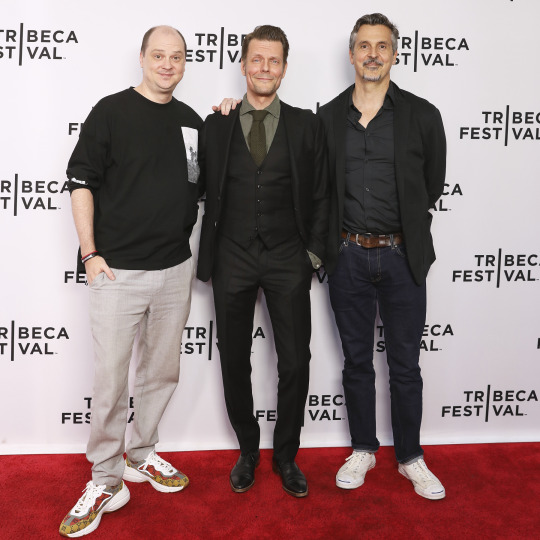
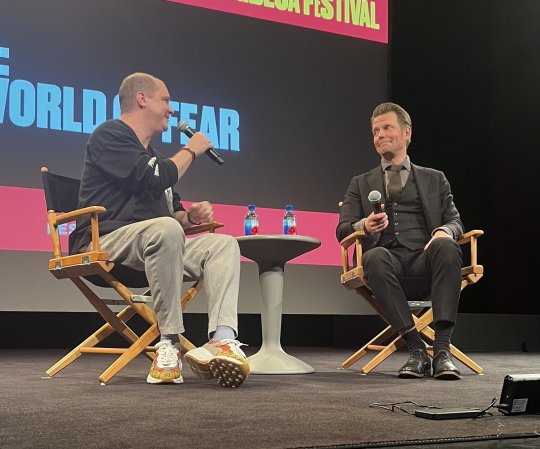
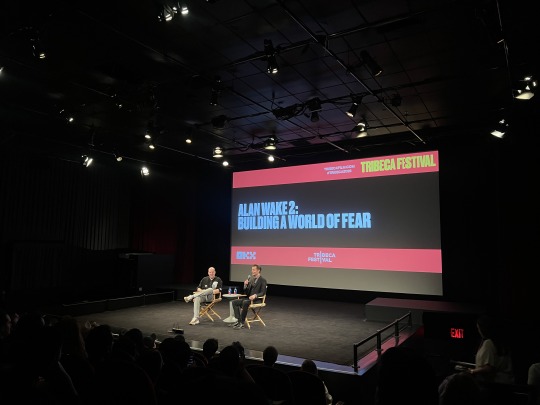
And my friend and colleague Justina Ireland traveled up to NY to moderate a Master Class where a theater full of people listened to me ramble about horror movies for an hour.
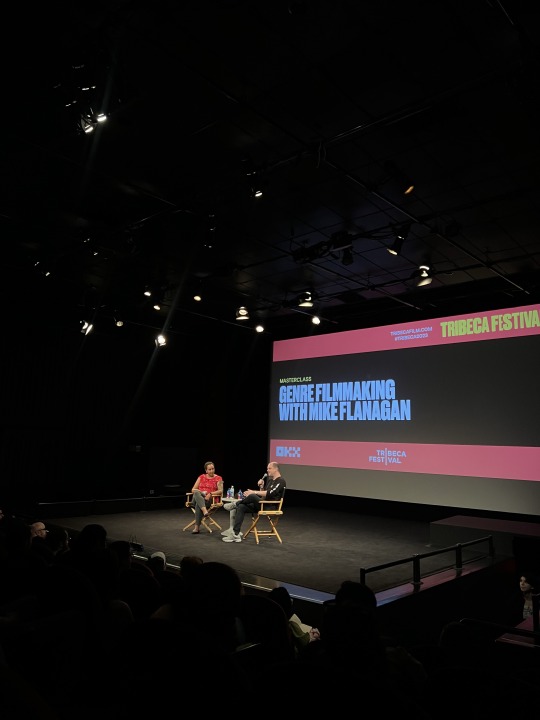
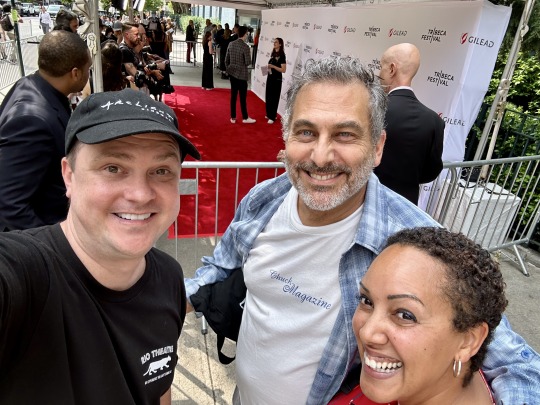
(With Justina Ireland and Johnathan Penner - Penner ran the Escape from Tribeca program, and it was his idea to bring me to the festival)
And then, just before I left, I met up with some friends to see a Broadway show. Karen Gillan and Willa Fitzgerald joined Kate and I to see Grey House.
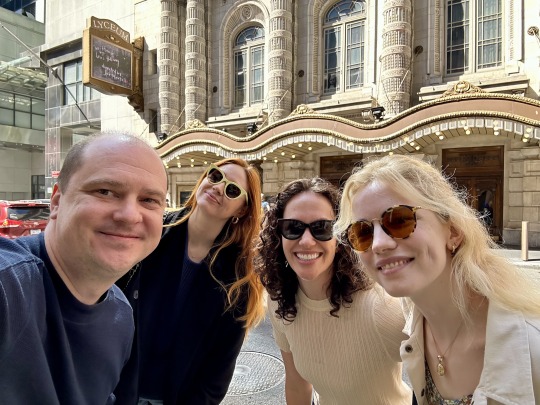
My experience at Tribeca was fantastic. It was such an amazing celebration of art and cinema, and I can't wait to go back. I spent a lot of it feeling overwhelmed, and feeling like I didn't quite deserve my seat at the table (imposter syndrome is just one of the staples of being a filmmaker, isn't it?) but I'm so glad I went.
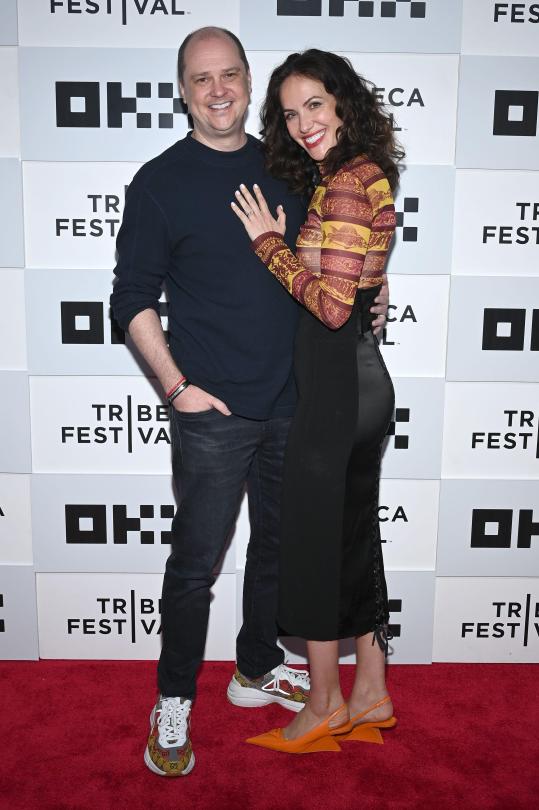
#tribeca#tribeca festival#robert de niro#martin scorsese#zoey deutch#stephanie hsu#chazz palminteri#sam lake#alan wake#remedy entertainment#alan wake 2#karen gillan#willa fitzgerald#grey house#broadway#tommy oliver#kate siegel#honestly this was one of the most fun festival experiences I've ever had
265 notes
·
View notes
Text
Tender Light Eps 1-4

Shoutout to @dangermousie for putting this show on my dash and pointing me to where I could find it, because this is extremely my shit. Zhang Xincheng’s presence alone was enough to peak my interest, but it's also a smarty paced mystery thriller with a noona romance and some truly gorgeous cinematography. I am already hooked.
There are a few things about this drama that stand out to me in particular:
The visual filmmaking is quite stylish and so many of the shots are absolutely beautiful
It has several mysteries stacked inside each other and a strong command of the details and carefully paced reveals for each
This story is dark and very interested in the corrosive power of mean-spirited gossip and the damage it can do in a community
The ML's attraction to the FL is raw and intense and explicitly sexual in a way I rarely see in cdrama, and I like both how much his natural interest and sympathy for her seems based in them both being town pariahs and how the gossip still warps the way he sees her despite the fact he of all people should know better than to believe what others say
The show is intentionally juxtaposing his sexual attraction with the physical and sexual violence the FL experiences in her marriage and the unwanted advances she receives from other men, in some ways he is no better than the rest
All of the characters are morally grey, there are no clear heroes or villains and it feels like everyone is both kind of right and kind of wrong about the things they believe of each other
It's also got a thread going about bias and abuse of power in policing and I am curious to see how far they take that
I'm finding this super compelling so far and the storytelling feels confident. I rarely watch cdramas live, but this one feels worth following along, sitting in each narrative beat, and having time to digest the reveals and the constant wtf reaction they inspire. This story feels like an onion with many layers to peel back and I want to get to the center.
#omg yall no one is giffing this beautiful show yet i’m suffering#tender light#cdrama#shan shouts into the void
64 notes
·
View notes
Text
Filmmaking? In My BL? - The Horror Influences of Dead Friend Forever
Okay off the bat I'ma say that this isn't me definitively saying these specific films or tv series are what inspired 100% DFF. I simply do not know what stuff the screenwriters were pulling from influence wise when writing the script, nor what the director was pulling from when directing the series, with 100% flawless certainty.
Rather, this is a chance to talk more about horror, from films, comics, visuals, and sub-genres and how these various mediums are what I see in the fabric of DFF's horror makeup. Also, general point, this post will be discussing minor spoilers of: Scream, DFF, and Girl from Nowhere. So like, be aware~~
This post is partially inspired by an ask from @italianpersonwithashippersheart in which the anon had mentioned Scream.
I couldn't really respond to this in detail before cause I hadn't watched the series, but I have now and I can say that the show is very thoroughly nothing at all like Scream. I'm not confident in much - other than my inability to reach the top shelf at the market - but I am confident in saying that lol
But this got me thinking, what type of horror IS DFF? I've seen a lot of folks say it's a slasher, and I both agree and disagree.
Horror as a genre is vast with sub-genres, it's probably one of the most universal and popular genres globally, and every culture has their own horror legends, cult classics, mainstays and shlock.
So that's what I'm going to talk about in this post, the slasher genre, why I don't think DFF 100% can be boxed into that sub-genre, what type of horror I think DFF is, and the influences I see in DFF's filmmaking and thematics.

So if we start anywhere, we gotta start with Scream (1996) since that's a comparison I've seen being made a lot.
The main reason I disagree in the comparisons to Scream is that Scream is considered a work of satire first and foremost. Through the power of capitalism and franchising, it's also consider a "whodunit" series.
“Scream” is the first movie of its kind to execute a satire genre within a horror movie, which is one of the most iconic and memorable elements of the film. The original movie makes many references to other well-known horror films and mocks them, while simultaneously leading the same plot points. [...] Although the following films in the “Scream” franchise do not follow as much of the same mockery of horror films, they are still considered to be satirical because of their use of mockery toward the movie franchise. “Scream 2” mocks film sequels and “Scream 3” mocks film trilogies." (source)
[sidenote one of my favorite examples of satirical meta horror is Wes Craven's New Nightmare]
DFF isn't satirizing anything in horror, it's almost entirely self-serious. Sure there's a couple of moments of hilarity - dick biting, and scooter snatchin' - but overall the show plays things pretty straight (gay sex notwithstanding). I've seen some folks claim it's subverting horror tropes, but I don't see that either (would be interested in discussing that tho cause I'm curious).
I get why people make this comparison though, Scream is a 27 yr old franchise, and probably the most relevant slasher franchise currently. The new Halloween movies were...cute but aside from the first Halloween (2018) the rest of the reboot franchise had diminishing returns; each film made less than the previous, and received lower critical scores.
However, Scream has actually grown as a franchise in the States in terms of box office draw. That said, Scream is actually not a huge earner overseas, Scream IV (2023) earned more than 60% of it's box office revenue domestically. In Thailand, according to reports, it only earned about 300,000 (compared to other international territories like Brazil where it earned around 4,600,000).
So I don't think DFF is pulling much from Scream in terms of setting, tone, or story. I do think the show most resembles Scream in directorial style, specifically in the imagery of the Killer's design and in the slow-crawl mask reveals that have happened so far.
youtube

[very obviously spoilers for all the scream films watch at your own risk etc, gif by @my-rose-tinted-glasses]
So what is a slasher film or story?
"A slasher movie is a horror sub-genre that involves the murdering of a number of people by a psychopathic killer, typically via a knife or bladed tool (such as a scythe).
In general, the horror genre is known for its fear, violence and terror. It will typically feature a menacing villain, whether it be a monster or a supernatural evil spirit, for example." (source)
Other common but not inherent secondary characteristics of a slasher story will include: young adults as central characters, sex (typically as a means of punishment "sex gets you killed"), the killer is motivated by revenge, lots of gore and/or violent kills and a "final girl".
I point out common but not inherent because the main tenants of a slasher story is the overall body count, female protagonist and a mysterious (typically masked) killer.
For example, in Scream (96) Ghostface is motivated by revenge, however in Halloween (1978), Texas Chainsaw (1974), Prom Night (2008), You're Next (2011) and Wrong Turn (2003) the killers are not.
If there is a western horror franchise or film that the setting of DFF more closely aligns with, it's Friday the 13th (2009). Which was a sequel/reboot to the original Friday the 13th (1980) starring Tumblr's own Jared Padalecki as one of the leads (that was an interesting year as Jensen Ackles also starred in a remake of a classic 80s horror film My Blood Valentine).
In Friday (09) the bulk of the story takes place at a mansion styled cabin in the woods near Crystal Lake owned by one of the characters rich parents. Jason eventually hunts down each of the characters, killing them in various ways, and they even find his home with a shrine to his mother there. There's also like, a lot of sex and nudity in Friday (09) none of it fun or sexy as it's pretty, unfortunately, misogynistic.
Being in an isolated area, like the cabin in the woods in DFF and Friday (09) is also not a requirement within the slasher sub-genre.
Many slasher films, especially American classics during the genres 80s peak, actually take place more often in suburbia rather than in isolated locations like the woods. Which reflected real world anxieties from predominately white communities and a turn towards more conservative politics of that era in America.
"Those same well-kept neighborhoods and quiet backyards of my childhood were also the battlegrounds of the ’80s horror movie, a radical pivot in the genre’s history. The decade’s opening years were bracketed by the kidnappings of Etan Patz (which inspired the Missing Kids on a Milk Carton program) and Adam Walsh (which inspired his father John Walsh to later create the TV show "America’s Most Wanted"). Combined with the conservative turn in crime and punishment law brought on by the Reagan administration, horror appeared to turn from the supernatural curses of the decade before ("The Exorcist," "The Omen") to a homegrown product of our own sins. Michael Myers, Jason Voorhees and Freddy Krueger are psychotic loons but also human beings who come not from afar but from down the street. The possibility that one of them could be lurking just beyond the sliding back door of a sleepover birthday seems too darkly delicious to pass up, a fictional killer standing in for a warning your parents and society gave you about “stranger danger,” real-life evil lurking in the dark." (source)
Isolated settings, while can be a setting in slashers are more often found in psychological horror films: The Strangers (2008), When A Stranger Calls (1979, 2006), Hush (2016). Also the Evil Dead (1981, 1987, 2013).
[The latter has it's own interesting history of wanting to be psychological body horror, to horror comedy cult classic, back to psychological body horror. Honestly if any franchise has influenced the "horror set in a cabin in the woods" it's Evil Dead, which is paid major homage to in Cabin in the Woods (2011).]
Sooooo is DFF a slasher?
Hm, for me, yes and no. Slashers require a high body count and pretty gory deaths. So far we've only had 3 deaths, only two of which were even committed by the killer themselves and not even by their own hand (ie directly).
For me, the slasher elements of DFF exist in the directorial styling of the film, meant invoke a classic slasher film but that's not where the true horror of the story exists.
I'm a big slasher fan, so I'm not trying to discount the sub-genre at all, lots of slasher films are good, and when done well, they're truly scary. But they also tend to be straight forward in design, the fear comes from the feature of being stalked by an unseeable and unstoppable force infiltrating what should be a safe space (your home, your school, your neighborhood, your camp grounds etc).
Which is why slasher films are also the most common horror sub-genre to be parodied (Scary Movie franchise) or made into horror comedies like Freaky (2020), The Final Girls (2015), Happy Death Day (2017), and Totally Killer (2023).
[sidenote slashers have this in common with the zombie sub-genre of horror as zombie films in America have also tended in recent years to be horror comedies or horror action like: Little Monsters (2019), Cooties (2014), Zombieland (2009), Pride Prejudice and Zombies (2016)]
I'd argue that DFF is much more in line with psychological horror than slasher horror. Because it is anything but straightforward and also has a strong emphasis on relationships and isolation as does most psychological horror.
Films like: It Comes At Night (2017), Us (2019), Perfect Blue (1997), A Tale of Two Sisters (2004), The Forgotten (2017), Dark Water (2002) all have similar elements in terms of tone as DFF.
The isolated setting, the allure of the mundane normality being a veneer for the violence lurking beneath the surface, the existence of the paranormal, the use of drugs to increase fear, the unsettling paranoia, and slow burn crawl towards all the characters being unteathered from themselves, the growing distrust between them and their loved ones, the plot twists and turns, the emphasis on human relationships and the horror that comes from those.
The backstory with Non is what pushed the show past slasher horror to psychological horror for me. Because Non's "downfall" as it were, feels more akin to the slow burn psych horror rooted in a lot of Japanese, Thai films/tv shows, and modern A24 style horror films.
The horror of Midsommar (2019) doesn't come from jump scares, or violence, but in slowly watching the protagonist grow more and more unteathered, mistreated, gaslit, more and more with each passing moment, slowly inducted into a horrific cult and being able to do nothing to stop her descent.
A big influence I saw in DFF was Girl from Nowhere (2018); the school setting, the crimes committed by a group of students against a singular student, class exploration, structural violence, the exploration of retribution are all topics explored in the first season of Girl from Nowhere.
Even the series trailer for GFN and the pre-release trailer for DFF are similar in production design and tone:
youtube
youtube
Titled "BFF" the two-part finale from season 01, is about a high school reunion, where a group of now established adults come back together for a party (their reunion) only to be confronted by their past via Nanno (the shows protagonist for lack of a better term).
Through Nanno we learn about the chars past misdeeds in high school - bullying, physical assault, stealing, the works - and their current crimes as adults. As more and more layers of the truth, lies, and betrayal are revealed, the friend group begins to crack, fracture and turn against each other, growing more and more paranoid and angry.
Nanno tells the group that they've also all been drugged with poison and there's only one vial of antidote left, the "friends" all horrifically murder each other in order to get the antidote. In the end, no one survives. EXCEPT, it was all a mass hallucinate and the group wakes up, remembering everything, and quietly leave one-by-one. No longer friends, no longer not-friends, everyone forever changed by the experience.
It's an unsettling ending that leaves things open ended. This group of friends were responsible for the bullying and death of Nanno (she's fine she's like immortal or something I'm pretty sure GFN was partially influenced by Tomie by Junji Ito) and they simply refused to acknowledge what they did to her, nor talk about her, eventually forgetting she existed until forced too through a traumatic retribution by Nanno herself.

[Nanno from Girl from Nowhere, Tomie from Junji Ito's Tomie series]
DFF has a lot in common, from my perspective, with GFN in terms of tone, themes and even parts of it's story.
Nanno isn't doling out "justice" she doles out retributions, punishments, sometimes they're outright torturous. Whether the recipients "deserve" these punishments or not, is really up to the viewer. The show does a good job of showcasing a wide variety of characters who are unrepentant, sympathetic, and somewhere in between. The fears it plays upon are more slow burn, it boils the characters rather than setting them on fire like slashers do.
DFF is similar in this aspect, it boils the characters. Watching Non's story, you already know at the start it's nothing good. We know from the first flashback something bad has happened to Non, but it's not really something, it's many things - so many things - that have led to whatever tragedy the main group must pay for.
It's these compounding factors one after another that brings Non to a boil, and the same thing happens with Tan/New. The horror of DFF is more about getting under the skin, causing the characters discomfort by forcing them to confront the sins they've committed (is there anything more horrific than being seen? Especially if you ugly?).
I mentioned Junji Ito in reference to Girl from Nowhere, to say Ito has been influential on horror feels like an understatement. His series Tomie has been adapted into 7 different Japanese films, he's won 3 Eisner awards (the highest award you can win in America for comics publishing), along with a slew of awards in Japan, his series Uzumaki has been referenced in super popular anime like Jujustu Kaisen.
A big factor of Ito's work is body horror and psychological horror. His work unsettles, and is very visceral. Since Uzumaki was referenced in DFF I think rather than being influenced by specifically Uzumaki (which DFF doesn't have much in common with in regards to general story) I'd argue the show is more influenced by Ito's desire to unsettle.

[from Uzumaki], 1998]
Also potentially to take symbols of piety, faith and protection (the temple, the cross at the chars high school) and turn them into places of horror for the characters.
Like Ito did with the spiral motifs in Uzumaki, said Ito in an interview:
"The "spiral pattern" is not normally associated with horror fiction. Usually spiral patterns mark character’s cheeks in Japanese comedy cartoons, representing an effect of warmth. However, I thought it could be used in horror if I drew it a different way." (source)
[I am also begging y'all to check out Junji Ito's book Cat Diary it's hilarious, even more so b/c his style of art is so rooted in horror]
I think DFF is actually very Thai in it's exploration of what's unsettling and horrific to youth culture in Thailand currently. The feeling of haplessness, judgement, an inability to exert control over one's circumstances, mental health, consent, bullying, these were themes and topics explored in both seasons of GFN but also some of these were explored in The Whole Truth (2021) a Thai horror/mystery film.
There's a scene in The Whole Truth in which one of the protagonists school friends secretly films their younger sister getting undressed without her knowledge, and when caught, the classmate threatens to release the clip publicly and claim the sister is "a slut". One of the protagonists is also bullied at school - including by this disgusting classmate who they still consider "a friend" - but puts up with it in order to be in a friend group at all (this bullied char also has a physical disability which contributes to their mistreatment at school).
I think DFF is exploring a lot of these same topics but most of the characters are just gay this time around.
Okay I'm losing steam here a bit, this has gotten very long, but overall I'd argue that DFF is much more psychological horror than a slasher, in terms of it's tone, and story. Whilst invoking slasher imagery in it's directorial style.
That said it's much more in line with Thai and Japanese horror than American horror in regards to it's themes. If the series was going to be boiled down just to the basics, I'd quantify it as psychological horror mystery.
And those are my thoughts on DFF and horror, I guess lol I'm not 100% satisfied with this but god damn I'm tired this took forever lmao if y'all made it this far, bless and stay safe out there cause the ship wars are wildin out in these parts.
Check out other posts in the series:
Film Making? In My BL? - The Sign ep01 Edition | Aspect Ratio in Love for Love's Sake | Cinematography in My BL - Our Skyy2 vs kinnporsche, 2gether vs semantic error, 1000 Stars vs The Sign | How The Sign Uses CGI | Is BL Being Overly Influenced by Modern Western Romance Tropes? | Trends in BL (Sorta): Genre Trends
[like these posts? drop me a couple pennies on ko-fi]
#dff the series#dff spoilers#dff meta#dead friend forever#dead friend forever the series#chaos pikachu metas#pikachu's bl film series#fuckin a this is long#almost ran through my entire final fantasy soundtracks playlist#and that's a lot of freaking final fantasy games
88 notes
·
View notes
Photo
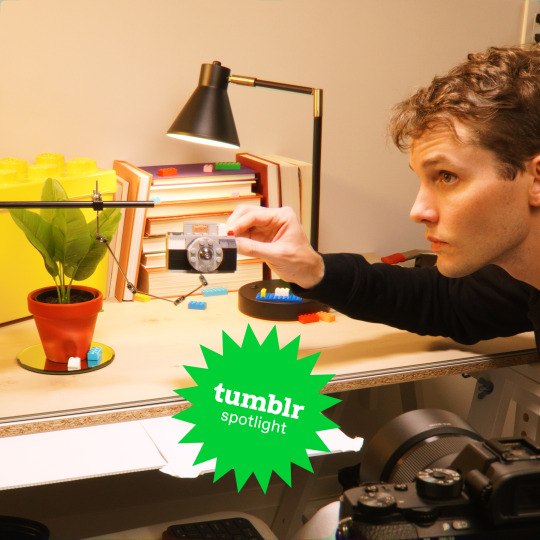
Creator Spotlight: @kevinbparry
Kevin Parry is a stop-motion animator and visual effects artist in Toronto, Canada, who creates magical and mind-bending content for brands. Prior to working in social media full-time, he animated a number of stop-motion feature films at Portland-based LAIKA.
Check out our interview with Kevin below!
How did you get your start in stop motion and animation in general?
I was always very interested in moviemaking (monster makeup and visual effects), and that led to me studying animation in college, where I specialized in stop-motion.
How has technology changed the way you approach your work?
The shift to shorter content through social media feeds has made me approach storytelling in a more concise way. When I first started my career, ‘short form’ meant a story maybe 4 minutes in length. Now, I make videos that are as short as 4 seconds!
Over the years as an animator, who/what were your biggest inspirations behind your creativity?
I’m a big fan of directors and artists who have a bit more texture to their work - blending old-school, handcrafted techniques with modern technology. Filmmakers like Michel Gondry and Wes Anderson. And, of course, magicians! The surprise and delight of magic is something I try to capture in my work.
If there is one thing you want your audience to remember about your work, what would it be?
That I left them feeling stumped and curious about how I made it! It’s the best feeling when someone tells me they watched my video a dozen times and still can’t figure it out.
As we’re wrapping up with the year, what is one thing you learnt about yourself as a creator in 2022? Any goals for 2023?
This year, I’ve been focusing on making my work less polished. Meaning ditching green screens and doing a lot more of my stop-motion and visual effects in camera. It’s a bit of a battle with the perfectionist in me, but I think my work can have a lot more charm to it if I embrace mistakes and the rougher edges.
How did you transition from working for a company to working freelance?
I was working on stop-motion animated feature films at LAIKA and then eventually left to pursue social media full-time. There were a few years of overlap where I built up an audience and had already started to get offers from companies before finally making the leap. I’m thankful for all the years spent doing studio work because it prepared me for the business side of freelance—stuff like pitching concepts and understanding when work needs to serve the client and not myself.
Do you have any tips for creators out there looking to make the same move?
My two tips are:
Be as unique as possible. You want to give companies a reason to come to you, and not someone else.
Find a balance in your work between Hollywood and homemade. You want it to be professional enough that companies trust you with their brand but approachable enough that it blends in well on social media.
Who on Tumblr inspires you and why?
To be honest, I’m new to Tumblr! I signed up a few weeks ago and have just begun to explore the fantastic content. If people can leave a comment with who I should check out, that would be fantastic!
Thank you for stopping by, Kevin! Be sure to check out more of their work over at @kevinbparry, and drop a comment below with who Kevin should check out on Tumblr!
522 notes
·
View notes
Text
✨Toxicity✨: What would have happened if you stayed?
Helloo. So this is going to be for anyone who feels in two minds about their decision to walk away from a situation.
Sorry in advance, the piles are so long! I really meant to be more succinct. So, grab a snack or break up the reading ahah 😅.
This can be used for any kind of situation: professional, romantic, platonic, etc. Options are left to right. Hope it resonates :)

For the collective:
P.S.I took time out to do a guided meditation to connect with my intuition. So some of you may benefit from that. Some personal messages came through for me as well. So your guides probably want to connect with you too.
I used a guided meditation on YouTube but feel free to do whatever resonates best with you.
Without further ado 🙇♀️🎩 ...
Pile 1
**TW: Substance Abuse**Off the bat: So before I even really began the reading, I was channeling Hey There Delilah by Plain White T's. So idk if that is relevant somehow. I was thinking of a lot of early 2000s songs. I feel very eager and excited. So maybe some of you left home behind to chase your dreams in someway. So, every win is a little bittersweet.
Honestly, its such a vibe rn. I'm feeling chill, room is dimly lit, there's thin swirls of smoke coming from the burning sage...
4-card spread: Ace of Disks, The High Priestess, Prince of Cups, 7 of Disks. Bottom of Deck is Knight of Wands.
So, for context I'm using The Urban Tarot Deck. I feel like the imagery really helps with this pile. Its a Thoth inspired deck so the names for the cards are a little different. I read Knights as Kings and Princes as Knights.
All right, so right away I feel kind of confined. I don't think you would have had a horrible life or situation but it would not have been all that you needed. You would continue secretly dreaming of the life that you truly want. Whatever that means to you. I say this because the woman on the high priestess card looks very dreamy. Like she stole away and ran herself a bath just to have a few moments of solitude. But with the "knight of cups" right next to her--which is another card that can signify illusions, fantasies, daydreaming--it feels like she's dreaming of what could have been. And what could still be!
I always read this knight of cups as an amateur filmmaker. Someone just starting out, perhaps a little pretentious, but their intentions are in the right place. The fact that its a card that isn't fully mature, like a king of cups for instance, makes it seem tangible. So the woman isn't jumping to the ultimate end goal, but what could reasonably happen. This dream just lives in her head. Something she keeps for herself.
This is supported by the ace of disks (pentacles) and the 7 of disks. The 7 of pentacles can show patience as you wait on your investments or considering whether you invest or not. Aces are new starts. So, you would still be thinking about whatever alternative option you rejected to stay. Maybe you would know its still on the table and that's why you toy with the idea as a contingency plan. You know your growth is being stunted. Honestly for this group I think you were meant to leave. I don't think you would ever have been able to throw away this opportunity.
The king of wands is passionate and action oriented. This is how you would yearn to be. An energy like this cannot be contained. For some of you this may be referring to leaving a family dynamic or hometown behind. Right under the king is the 8 of cups reversed. With the imagery, I'm getting substance abuse problems. Maybe its common where you're from, alcoholism in particular. With it reversed, I think you would want to cut ties once and for all. Like just ghost friends, cousins, maybe even a partner. Like its the sort of thing where there may be all this lore associated with your name back home.
You will see what you could turn out like and decide to just go. For some this could relate to a job too. Maybe you see how the job consumes people around you, people lose relationships, some may get depressed, start drinking. You might have "noped" out of that and decided to carve your own path.
For those resonating with more of a family dynamic, I think you might experience some kind of loss. The kind of loss that acts as the straw that breaks the camel's back. Like I'm hearing "well, if Granny G/GG ain't here anymore, wtf am I doing here?" For others you could experience some kind of deep betrayal like a cheating spouse, a backstabbing best friend. And it will just make you go "fuck it" and choose yourself. You might not even be about all that lovey-dovey crap anyway.
Oracle Message:
The oracle cards basically repeated the same message: Imposter Syndrome, Forever a Phoenix, and Emergence. Its literally what I- like look at this:
"Sometimes you can't save it. Sometimes you have to take what's left and what lessons you have learned and simply just watch the rest burn to the ground." (Forever a Phoenix)
The message of feeling confined comes up as well. The emergence card depicts a butterfly woman emerging from her cocoon.
It's giving...I REST MY CASE.

Pile 2
Off the bat: A lot of you could be watching for an academic or professional situations. It reminds me of when I had to choose another school over my first choice. In hindsight, that was the best decision I could have made. I now can truly understand the saying "thank god for unanswered prayers." A move could be significant in someway so maybe some of you relocated or chose to stay where you are.
4-card spread: 9 of Wands, Wheel of Fortune, The Moon, The Hanged Man. Bottom of deck is The Fool.
I immediately started to feel a lot of anxiety. My chest feels kind of tight. If you hadn't left maybe you would have dealt with a lot of anxiety or panic attacks. I feel like the environment would have been stifling. A lot of major arcanas in a spread can sometimes signify stability or a lack of change. So if you are watching for a professional situation (academic counts too), you might not have progressed. This could look like never being given promotions. For others I am getting a combo of work and school like a dance academy or something. In a situation like this may always skip over you when it comes time for assigning solos. There is also a lot of romantic energy coming through but please consider how it resonates for your situation.
I also think something about remaining in whatever this is, would have caused you to doubt yourself. The moon and the wheel of fortune side by side could hint at emotional or mental instability. While I do read the wheel as a positive card, because it is something that is always turning, it can also represent a certain predictable unpredictability. The 9 of wands reinforces the message about being on guard. I think it would have been really exhausting to keep up with this toxicity indefinitely.
If this represents a romantic "third party" situation, the affair would have continued in the same way it was going. This applies regardless of which side of the third party you fall on. So if you were in a relationship with the person already, they would keep cheating. Or you would never be able to relax because you'd always be waiting for the next shoe to drop. Always on the look out for signs they're back to their old ways and never fully being able to trust them. No relationship can thrive in the those circumstances. So it would leave you frozen in this state of constant misery.
For others, if you resonate with being the person they snuck around with or if you were one of the many people they were entertaining, they would have kept that up, unfortunately. You would probably get resentful eventually. You may not even get any kind of title that would hint at some kind of significance to your relationship. They would not show the kind of effort that makes you go, "wow, they really value me and want to make this connection work". Nope, with the wheel and the fool. They would want to continue popping in and out with no thought to how it could throw you off balance. They could ghost. Your self-esteem and ability to ground yourself would really suffer.
This could also apply for situations where cheating wasn't the issue or at least it wasn't the only one. If the other person was rude, or controlling, or just awful, that would have continued. It would be you giving up parts of yourself and your peace to keep things afloat. They would still poster like they are "self-made" and like they're a great person.
Oracle Message:
I haven't pulled anything yet but some of you may benefit from meditating. If this is something you have been practicing and wonder if there's any point, there is but the benefits are cumulative. So, you have to stick with it. Same with therapy, fitness journeys, or health journeys. Any kind of self-care. You just gotta be consistent.
I am pulling from my affirmation cards deck. I'm going to insert a pic. "Today I am responsible" and "today I am at peace" came out together. My intentions were to read these cards as if they came out reversed. So with that in mind, you would have continued being in a lot drama and back and forth. The situation would be detrimental to your mental health and possibly physical health. Think a partner or friend that uses substances and so it makes it easier for you to get into. You might not get as much joy out of life and work would be unfulfilling. Overall, you would not experience much growth as a person.
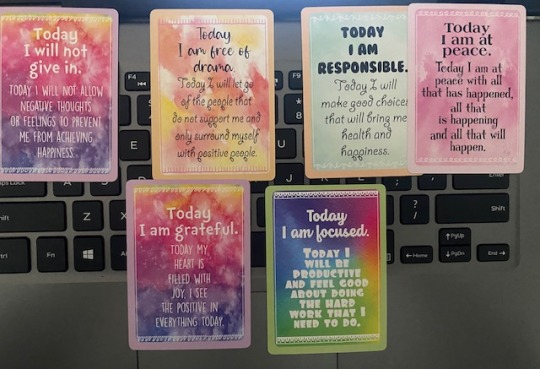
Pile 3
Off the bat: I am getting more relationship and love energy. But if you are here for something nonromantic, just change the love stuff to fit your situation. Many of you are here for friends or significant others. For some of you, this reading may not be "that deep." Like perhaps this is just a crush that you moved on from and you're wondering what could have happened with them. Others you might have left a party and you're trying to quash the feelings of FOMO lol. Bubbles from The Powerpuff Girls could be significant for some reason.
4-card spread: 10 of Swords, Ten of Cups, Ace of Swords, King of Pentacles. Bottom of deck is 4 of Cups.
I just want to note that the king of pentacles came out sideways. So if there is a flakey or unreliable person in this situation, they would have let you down. So for some resonating with a party or a gathering, if you wanted to stay because a friend or a crush was there, they might have ended up ditching you anyway. You could have stayed and realized this person was not even available, so perhaps they came with someone else. You might have just ended up bored, in your feelings, and way too drunk.
Next, if this was someone that was breadcrumbing you or kind of one foot in, one foot out, they have the potential to really disappoint you. I say this because of the sideways king of pentacles, ten of swords, 4 of cups, and the 6 of pentacles right under the 4 of cups. So you could have ended up feeling unfulfilled emotionally or practically (e.g. quality time). This other person could be kind of cocky, especially if they have a lot of other friend or dating options.
For others of you, staying could have led to pregnancy or children in some way. So this could be a partner or spouse that you considered staying with. A few examples I am getting: Having a child with this person, staying with them and starting a family, finding out they had a child or family with someone else.
The storyline is kind of splitting at this point. Some of this could resonate or none of it, so trust your gut. There's a group of you where things would not have been that bad. This is only for people who had a decent relationship with the person. Maybe the main issue was that you both weren't mature enough or stable enough to have a baby or a super serious relationship. This pregnancy would make you two very happy and would bring you closer together. Even if you ended up co-parenting, I think it would be okay for the most part.
Now, for the other half of the storyline...it's not such a happy ending. If something told you this person was not reliable enough to have a family with, that was likely the truth. They seem like the sort of person that would seem cool to start. They would act like they are going to step up. Think coming around your family more, being present for first ultrasounds, looking at apartments with you. I do think there would still be an air of detachment though. Unfortunately, this person gives me the vibe that they would just go cold. Like they may start off seeming bored, then escalate to "no call, no show" type of behavior, culminating in them ghosting or being very hard to reach. They aren't as ready as they seem and you would be mostly on your own. Whether this means as a single parent or them letting your relationship fall apart. They could continue posting online with their friends, when you were supposed to go to an open house, or crib shopping, or having your baby shower...you get the idea.
Oracle Message:
I am pulling from a non tarot deck. I will insert a picture of the cards. It would be a lot to type out in order to explain properly. 😅You could resonate with certain cards more than others.
(OMG you know what I just realized. I was getting Bubbles earlier and isn't that what Summer Walker calls her baby? If you know about her and her relationship drama, that could be more confirmation.)
For some of you, you could see "what could have been," reflected in one of your friend's life. Maybe they made the opposite decision than you. The cards talking about fate lead me to believe that maybe things worked out in your best interests. In hindsight, you might be able to see how you dodged a bullet. Perhaps you would have had to sacrifice your goals, boundaries, or self-love.
The other person seems really messy. The first, third, and sixth card make me think that. The first card is again making me feel like they could have a group that they run with that probably isn't the best influence. Maybe they have a lot of run-ins with the law. Impulsivity and recklessness could be the norm with this person.
Also, it would probably be very hard to trust this person. Specifically, it would be veryy hard to trust they will change. You could have the same conversations and just go around in circles with no results. The trust question makes me think of couples counseling and the card next to it reminds me of individual counseling. You would probably get more out of one-on-one counseling. Whatever decision you made here was the right one.

I've been considering offering personals. I would probably put a quota on certain readings just so we are all "consuming responsibly", so to say. It would also just make me feel more a little more comfy. Boundaries were the main reason I stopped doing readings for anyone besides myself. I need to have my ducks in a row so for now it's just a thought.
Anywhoo 🦉 I've got soo many more readings planned. The last one from the poll will be a classic love reading. I will probably do another poll so keep an eye out for that! 💋
~K
#tarotcommunity#pick a card#tarot#intuitive readings#tarot reading#oracle reading#spirituality#oracle cards#pick a pile#pick a card reading
51 notes
·
View notes
Text
Pain, Suffering, and Narratives in Some Asian Dramas/BLs (An Utterly Un-Scholastic, Highly Personal Big Meta)
I’ve been meditating on the topic of pain and suffering in dramas over the last few weeks, as conversations across Tumblr have been taking place regarding the success (or not) of the Our Skyy 2 x Bad Buddy x A Tale of Thousand Stars episodes. I can’t help but connect these thoughts to some of the fabulous older shows I’ve been watching in my Old GMMTV Challenge watchlist project, where I’m catching up on older Thai BLs in order to better understand the fabulous works that we’re seeing airing now. This Big Meta in part comes out of my having just watched He’s Coming To Me and Dark Blue Kiss, but I was also very deeply inspired by a Japanese BL that many of us here have fallen in love with, Our Dining Table, that features a poignant moment recognizing that feeling pain is a necessity in feeling love for another person -- that accepting pain and suffering is a part of the life we decide to live, from an Asian cultural perspective.
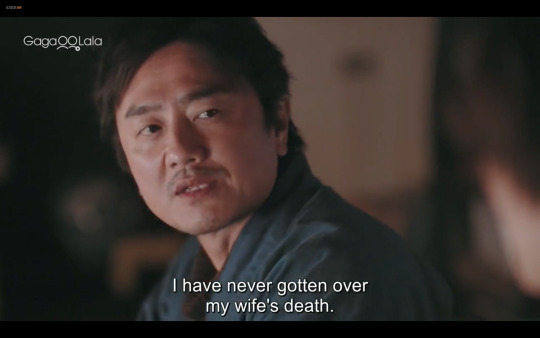

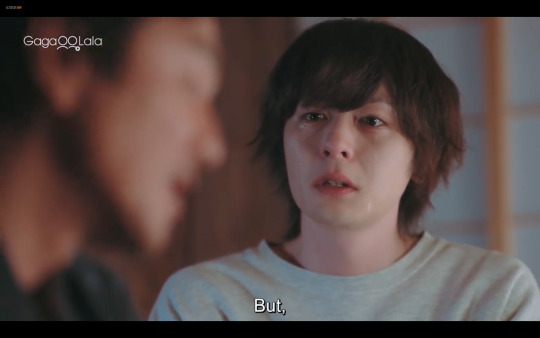
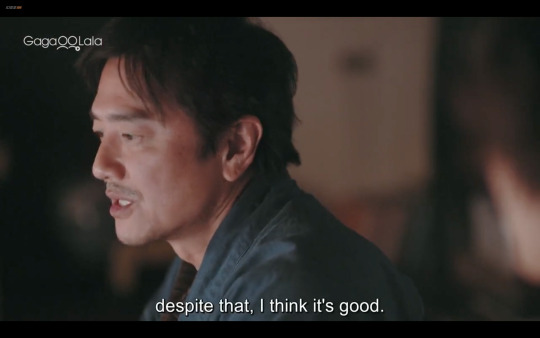



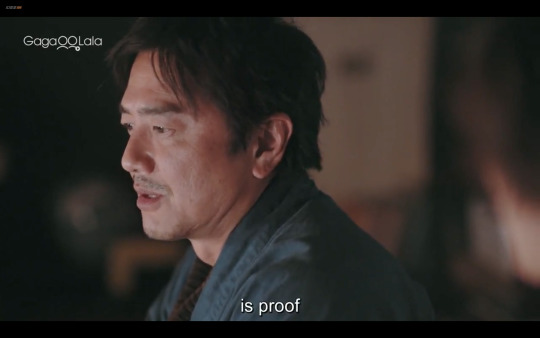

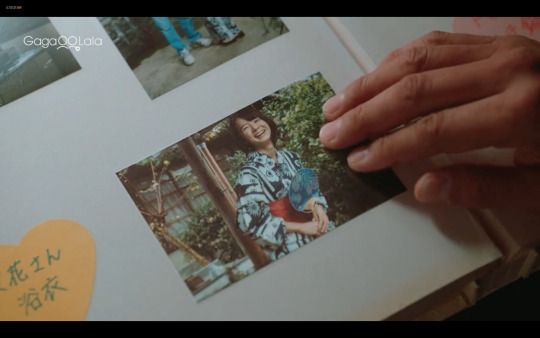
I’m using some big generalities here, so let me explain where I’m coming from. During certain large portions of my life, I’ve explored either becoming a Buddhist, or at least practiced Buddhism, particularly Zen Buddhism. While the world of Western capitalism has unfortunately taken up the majority of my current time/life, I do still have a desire to learn more about the history of Buddhism and try to incorporate some kind of practice in my daily life.
The reason why I offer that caveat is that a core of teaching in at least the spaces of Buddhism that I’ve been privy to, is the recognition of pain and suffering in one’s life. Suffering is a core tenet of Buddhism, one of the Four Noble Truths, and one that a human being does good deeds or makes merit in light of (as we see quite often in our beloved BLs) in order to receive “good” karma for a happy existence in this life or the next. (Again, mad generalizations here, but you get the point.)
I’ve been thinking about this because I often wonder if us Western viewers (I count myself as one, as an Asian-American) are too demanding for linear, clean, direct, and/or happy communication, narratives, and endings, particularly in the realm of Asian BLs, in regards to either romantic love and/or love from one’s nuclear parents/family. I think about this very much in the context of the Asian BL genre, where queerness -- as accepted, OR NOT, in Asian societies, friend groups, and families -- may indicate an existence that is not necessarily a happy one.
There are other issues by way of demands from fans that often determine the outcome of a BL script, such as shipper demands for overtly sexual content. What I’m proposing here is that, in my opinion, some of the best dramas/BLs from Asia are rooted in a reflection and acceptance of the tenets of suffering as a natural part of Asian life and, subsequently, Asian art. I further propose that because of that acceptance of suffering, that we — Western viewers — are often left potentially feeling unsatisfied or unfulfilled by a particular ending of a drama. I posit that the linear/binary/clear outcomes that Western audiences so often demand are limiting in comparison to the non-binary, non-linear journeys and conclusions of art that Asian filmmakers can reach in their work, vis à vis à general cultural understanding that pain and suffering are a part of daily life.
Before I give a drama example, let me use one from real life, that is so very often reflected in art: filial piety. I wrote about filial piety quite a bit in my reviews of Double Savage, a non-BL from Thailand that focused on the plight of a discarded son who was judged by his father as a jinx.
When I try to explain to Western friends that Asian parental love is very often conditional (I myself have experienced it, and my experiences mirror those of my friends), I experience a lot of denial.
“There is NO WAY your parents don’t love you.”
“There is NO WAY your parents will ever give up on you. Even if they treat you badly, they love you.”
“In the West, we ALWAYS end up loving our children. That’s what society demands of PARENTS. We’re CONDITIONED to be like that.”
A major cultural competency issue that Western therapists face with Asian clients is when Western therapists say to Asian clients who are having family issues, “why don’t you just talk to your parents about what you’re feeling?” Talking to Asian parents about a child’s feelings, in MANY instances, is not realistic. The language of that kind of emotion may not even exist. AND, there are unspoken social boundaries AGAINST children having those conversations with their parents in the first place. To have those conversations would very well ROCK the foundation on which Asian families are structured.
My parents may love me — the dad in Double Savage mayyyy have loved his son? — but an Asian parent like that, so rooted in their JUDGEMENT AGAINST an offspring, will often not budge. Time and time again, my Asian friends and family will talk about how they felt unloved as a child -- especially if their skin was darker, if their siblings were more successful in school, if they were a middle child, etc. VERY often, our Asian parents don’t know what us children do by way of work -- my parents don’t know anything about my work, for instance.
The Western perspective and social demands for a STYLE of loving one’s children in a very particular, involved, and empathic way -- those cultural expectations don’t necessarily exist in Asia. So we see parents like, say, Non’s father in Dark Blue Kiss; or Korn’s father in Double Savage; or ESPECIALLY Uea’s mom in Bed Friend, a fantastic example of an Asian parent who takes PERSONALLY every aspect of her son’s social and sexual “differences,” blames him for those differences, and accuses him of ruining HER life vis à vis how he was born to be the way that he is.
And yet, at least for Korn and Uea -- we see those children, for the majority of their dramas, continuing to devote themselves to their parents. Because filial piety -- the Asian cultural and social demand for RESPECTING one’s parents above all else -- is existent and EXPECTED of almost EVERY living Asian, no matter where you live on the continent or your various diasporas.
The equation is: even if you suffer at the hands of your parents, even if you don’t receive unconditional love and empathy from your parents, you must sacrifice in order to respect and serve your parents. You can imagine how much therapy even one individual would need to process that -- if that individual even ALLOWED themselves to think about what was happening, which oftentimes doesn’t even happen.
I’m not saying that filial piety EQUALS suffering. What I’m saying is that the practice of filial piety will almost always ASSUME a level of suffering that one must undertake to participate in the practice of honoring one’s parents.
Where I felt this *assumption* most strongly and recently was in my viewings of three Aof Noppharnach shows: He’s Coming To Me, Dark Blue Kiss, and Our Skyy 2 x Bad Buddy x A Tale of Thousand Stars, but I think Double Savage and Bed Friend also fall into this category as well. Very quickly:
1) HCTM was rooted in storytelling around the practice of Thai-Chinese Buddhism. Thun’s suffering was apparent: he was fatherless, he was gay, and could see ghosts. AS WELL, Med’s suffering was that he didn’t know how he had died, and why he was being held in purgatory before moving on to his next life.
2) Dark Blue Kiss was rooted in internalized homophobia. My big review of DBK is coming next week, but quickly, between the two main couples (PeteKao and SunMork), you had internalized homophobia playing various roles of emotional INTERPLAY, that AFFECTED the external emotional demonstrations of the character -- particularly in Pete, who was viscerally working on becoming a calmer person, but was triggered by Kao’s internalized homophobia to not be open about their relationship, and Pete’s jealousy subsumed him. DBK is the only show I’m mentioning here that has a clean happy ending for all couples involved, but more on that in a second.
3) OS2 x BBS x ATOTS, on the Pat and Pran side, was rooted in a clear but indirect conflict between Pat and Pran about openness and independence. If Pat and Pran had been open about their relationship (à la Pete and Kao) -- would Pat have needed to sound tough to his engineering friends that Pran *depended* on Pat to close loops? And on the Tian and Phupha side -- there is plenty we don’t know about Phupha’s past to make judgements, but I think it’s safe to say that he grew up in such a rural environment in Thailand as to make him assume that coming out and meeting his partner’s parents was an non-reality for the majority of their relationship, until the end of the OS2 series. The journey to get to the point of the ring was a tough one, particularly for Tian, who wanted more openness.
4) Both Double Savage and Bed Friend seem to end happily, especially for Uea and King in Bed Friend. But: Uea loses his parent. Yes -- he NEEDED to lose his mom, because of how toxic she was. But from an Asian family structure perspective -- he only has his sister by the end of that traumatic journey, which is not necessarily an IDEAL or complete ending. The bonds among Korn, Win, and Rung are permanently affected by the behavior of Korn and Win’s dad in Double Savage. The ending is a copacetic one -- they have survived, and will learn to survive together, after all the trauma they have lived through. But it’s not necessarily a HAPPY one. Both of these endings do not necessarily reflect the holistic ideal of the Asian family structure.
I emphasize all of this because, as I said earlier: I think a Western demand to CLOSE LOOPS in Asian dramas is unrealistic.
In Asian life (big generalization, but let me roll with it): you are angry at your parents, and you process it internally, very often without any help, and after a couple days, things go back to the way they were. The children do not demand change from their parents.
In OS2 x BBS, what I DIDN’T SEE -- and, from this framework, what I argue that I DIDN’T *NEED* TO SEE -- were any clarifying conversations between Pat and Pran about how either of them would CHANGE for their relationship. The biggest confession we got was Pat telling Pran, “without you, there is no me,” and Pran quietly agreeing (thank you to @lurkingteapot and @dimplesandfierceeyes for the incredible post on the improved translation of “I can’t live without you”).
But throughout the episodes, we saw their existence together, and arguably, their conditions -- how each of them has organized himself to comport to the other’s immediate needs. How Pran’s larger burden of keeping in the closet to keep his nuclear family structure stable kept them from being totally out, and how Pran designed fibs to be able to have at least one public demonstration of love between him and Pat on stage. They know they cannot solve intergenerational trauma in the span of a series. They’re still closeted two years later. And throughout all of this: how Pat digests Pran’s needs, and keeps his (Pat’s) own needs for openness at bay. We know he feels pain, too, when he makes his confession to Pran in Pha Pun Dao. We know he’s watching Pran as Pran hesitates to put on the bruise cream.
I feel that Pat’s acceptance of this existence is both heart-rending and utterly beautiful from the perspective of seeing Aof’s work as *Asian* art. I feel like, as an Asian, that I KNOW, that PAT KNOWS, what Pran has to lose. Pran has A LOT to lose. And so, Pat -- instead of demanding for outing and openness -- will hold what Pran needs him to hold. He knows when Pran is grumpy, and needs to be grumpy. And Pran’s got a lot to deal with. He’s got so much that he’ll need to go to Singapore, likely to get separation from his mother -- and that will result in him and Pat being separated (and I’m intentionally not analyzing Pran’s need for space from Pat here, but I think we can safely argue that, too, as Pat’s helpful attitude may smother Pran at times) (and there’s also the issue of the nuclear pain that Pat himself may feel at losing trust in his father for his father’s past foibles).
After the OS2 episodes, I didn’t need to know THE REASONS, the stark REASONING for why Pran needed to go to Singapore -- because, indirectly, it was already very clear to me that these young men were already holding tremendous burdens. Singapore, for Pran AND for Pat, could have ultimately been a motivator for growth. But I don’t need to know this. All I know is that they continue to have various levels of pain that they will be dealing with in their nascent adult lives.
While Dark Blue Kiss ULTIMATELY had happy endings -- how it got there was PAINFUL. Kao was ROOTED in fear that he would upend his family’s stability, while being the breadwinner. He was held back by extremely traditional role expectations of an older son. And he had no communication with his mother about straying from those roles. Pete’s dad served as the first -- and, I’d argue, maybe BL’s first -- paradigm-breaker as a parent, being SO open about his son’s queerness as to encourage healthy sex practices. But what I argue in this thesis is that up until the very last, bitter end, Kao was relegated to ASSUME that he would live in pain. His expectation was that Pete would ride with him. Pete couldn’t take it anymore and bubbled over. And Kao was forced to make a decision, for Pete’s sake, literally, to BE open, and to save the relationship. That shit ain’t easy.
Lots of folks who have read my posts on this site know that I appreciate a good Asian drama rooted in family and/or community trauma, like 10 Years Ticket. It’s the way in which Asian filmmakers depict this trauma that speaks very much to my life, my culture, and my viewpoint on what’s realistic in this world, and how that reality can be depicted in art. What I’ve found in watching Asian dramas is... I don’t always want clean endings. I don’t always want loops closed.
Sometimes, Asian kids can’t talk to their parents (Pran, Kao). If you grow up like that, you don’t immediately learn the language of intimacy for your family members, your friends, your lovers (Pran’s struggles after BBS/ep5, Thun’s coming out and not knowing the words for it). It might be EASY, or culturally UNQUESTIONABLE, to not argue with your parents about the ways in which they engage with their children (Korn, Win, Pran). Sometimes, to make a break in order to survive, you need to leave a toxic family member behind, which is NOT an ideal scenario (Uea).
Sometimes, you lose the love of your life (Ueda-san in Our Dining Table). Sometimes, you fall in love with someone — and you find that you can’t *exist* without them (Pat to Pran). And you have to live with the pain. I might even posit that the risk of that pain makes the love you have, either for the person living or the person passed, that much more meaningful to you.
I watch Asian dramas because I don’t feel like Asian filmmakers are subject to the Western demand to clean up all emotionally questionable loose ends. This is not When Harry Met Sally. Harry and Sally should have only remained friends, and not gotten married -- even Nora Ephron and Rob Reiner knew that -- but they also realized that Western audiences would not accept such an ending.
“The script initially ended with Harry and Sally remaining friends and not pursuing a romantic relationship because she felt that was "the true ending", as did Reiner. Eventually, Ephron and Reiner realized that it would be a more appropriate ending for them to marry, though they admit that this was generally not a realistic outcome.”
If I don’t get clean clarity in Asian dramas, I’m okay with it. My mind switches to the pain POV, that relativity mindset. Everyday life in Asian cultures can handle the weight of the painful and sufferable unknown. And that’s why I love these shows.
And, OF COURSE, not ALL Asian dramas are like this! Cherry Magic ended wonderfully. Old Fashion Cupcake ended beautifully. KinnPorsche ended sexily, if not a little confusedly (are they related? kinda? or not? whatever?). Minato’s Laundromat ended happily -- although we’ll see their relationship pain points in the upcoming second season. And we see relationship pain points in the ongoing drama of Shiro and Kenji’s relationship in What Did You Eat Yesterday -- all while they share their happy nightly meals together at their kitchen table.
Life is complicated. I posit that Asian dramas, for my taste, satisfaction, and cultural relativity, do a much better job at depicting that complicatedness than the West can ever do, and that’s why I stand so often on my soapbox to encourage Western viewers to understand these Asian cultural touchpoints more -- to learn about how we’ve accepted pain and suffering as an automatic given in our Asian lives, from our cultures, our spiritual practices, and from living amongst each other.
#our skyy 2 x bad buddy x a tale of thousand stars#bad buddy#a tale of thousand stars#our skyy 2 x bbs x atots#he's coming to me#dark blue kiss#bed friend#double savage#pat x pran#pran x pat#patpran#pranpat#pete x kao#kao x pete#petekao#our dining table#minoru x yutaka#yutaka x minoru#pain and suffering in asian culture#suffering in buddhism#the four noble truths#pain and suffering in asian dramas#pain and suffering in asian BLs
179 notes
·
View notes
Text
Review: Wish (2023) [SPOILERS]
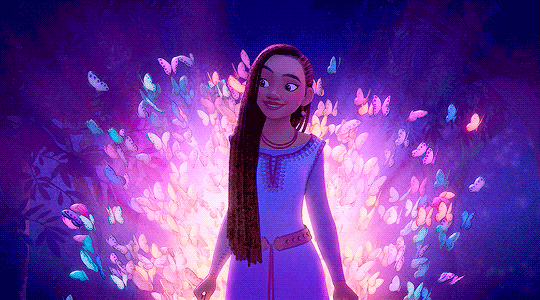
Evening, everyone! Tonight my mother and I went to go see Disney's most recent film, Wish, which fortunately came to theaters in my area right before its formal American release date. I'd been very curious to see how this tribute to Disney's last 100 years of filmmaking would turn out, and now that I've seen it...well, I have to be honest, I was a little disappointed. I want to be very clear both that I was going into this with a rather sunny outlook and that there are things I really liked in this film...but overall, it felt like a lot of the good ideas it had were only half-baked, and I found myself -- forgive me -- "wishing for something more" than what we got.
For a more comprehensive deep-dive...a cut!
The Good!
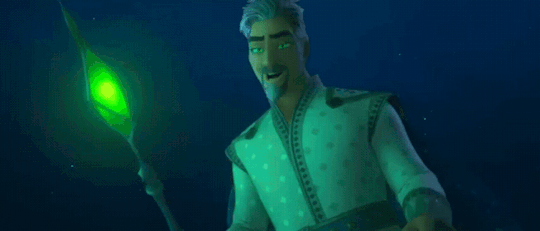
+The single best element in this film for me was Chris Pine's performance as our villain, Magnifico. There are definitely some things I can critique about Magnifico's overall storyline and "character arc" further down, but Chris was clearly having a grand old time being an egotistical, sassy jerkwad, and it totally showed. Even in his villain song This is The Thanks I Get?, which just screamed "passive-aggressive abusive parent," you can hear how much fun Chris was having in the studio, recording it. I just about always enjoyed when Magnifico was on screen, and I actually did really like the idea that a lot of his villainy is rooted in him being obsessed with control over everyone and everything. In a weird way, Magnifico's turn to the Dark Side parallels Anakin Skywalker's in the sense that he lost so much in the past that he's determined to never lose anything important to him again -- especially the power he's accrued to make himself feel strong, after having felt so powerless. I find that very interesting, and I kind of wish that aspect was really highlighted more in the story, but we'll talk about that later.
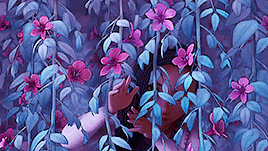
+Asha was a likable enough heroine, even if I found her to be a lot like a two-way fusion of Mulan and Anna placed in a vaguely Snow-White-ish role in her clearly Seven-Dwarf-inspired friend group. Ariana DeBose portrayed her rather well, both acting and singing-wise. I also liked the "social justice" bent to Asha's character where she wants better things not just for herself and her family, but also Rosas overall -- in the French translation of her main song "This Wish," they even push this further by having Asha wish "to see the world happy again someday." We haven't seen a heroine really express this kind of desire for a positive change in the world since Esmeralda in The Hunchback of Notre Dame, and that's cool! Plus representation in mainstream media for previously underrepresented groups is always nice. ^.^
+As much as I don't think they all got enough focus as individuals, I liked Asha's friend group! Especially the fact that it is a friend group made up of people that are around the same age as our protagonist, which -- let's be honest -- isn't that common for Disney heroines. Often with "sidekick groups," you're more likely to have situations like Cinderella with the mice (who are more like cutesy sidekicks than equals) or Snow White with the Dwarfs (who are all quite a bit older than our heroine)...so a friend group made up of peers with their own personalities and motivations was kind of fun.
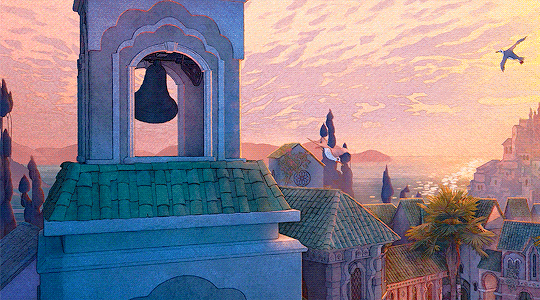
+The setting of Rosas itself could be pretty. I liked a lot of the Mediterranean-inspired architecture, especially inside Magnifico's tower.
+The combination of 3D and 2D-esque animation was also interesting! It really served to give the film its own distinctive visual style that sets it apart from other Disney projects, which I always appreciate.
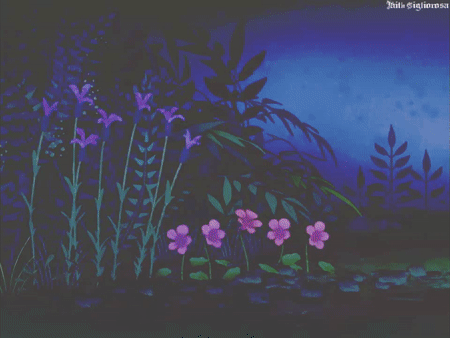
+Star was...cute. Obviously just designed to sell plushies and definitely reminded me way too much of Kirby, but cute enough. I do think it's kind of cool that they're never gendered at all in the entire movie, because it'd be silly to think of a sweet little androgynous ball of stardust as being specifically male or female.
+I liked the idea of Simon "betraying" Asha, only to be turned into a pawn by Magnifico in the process, but not being treated unsympathetically by the story for it. Didn't love the full execution of the idea, but hey, that's what the negative section is for.
+The idea of everyone finding the power inside of themselves to stand up against Magnifico (because they're "all stars," and presumably all have the magic needed to make their wishes come true) was a little predictable, but still sweet. I have problems with how the film wrote it (which we'll get to), but the idea itself was wholesome and fitting.
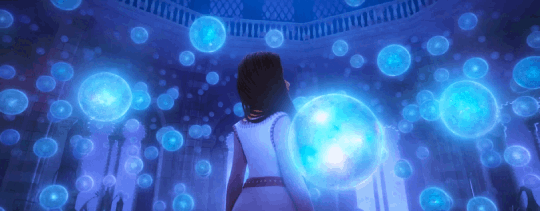
+I like several of the songs, just on their own -- I added This Wish and Knowing What I Know Now on my ITunes as soon as I first heard them prior to the film's release, and now I've added At All Costs too: it's a really pretty duet! (Gorgeous work, Chris and Ariana!) I'll leave my praise here, though, because sadly the soundtrack is going to get a lot of discussion in the less positive section.
The Not-So-Good...
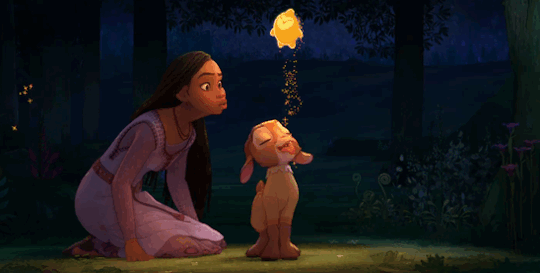
+This film being "Disney's 100th anniversary film" really got in the way of this movie telling a compelling and unique story sometimes. The whole movie really twisted itself into a pretzel trying to check off all the usual Disney tropes, and there were points that certain choices made the story seem incredibly stilted. For instance, one common Disney trope is a dead parent, so of course Asha has lost her father -- but we learn so little about him and he ends up playing such a small role in Asha's arc and story that it seems like an unnecessary detail. Asha's grandfather honestly plays more of a role in Asha's motivation throughout most of the film, so it would've made just as much sense to have Asha's grandfather be the one who believed in stars having power, rather than her father. Another example is the concept of the cute animal sidekick who's just there to make jokes -- as much as Valentino the goat didn't annoy me personally, he added just about nothing of value to the story whatsoever aside from comic relief, in contrast to other funny sidekicks like Sebastian from The Little Mermaid or Olaf from Frozen, who also serve a plot purpose and have a developed relationship with the protagonists. Then there's Asha being cut from the same "naive, awkward, wide-eyed idealist" cloth as many of our Disney Revival heroines like Anna, Rapunzel, and up to a certain point even Mirabel are; Star being in a similar vein to cutesy, innocent sidekicks like Pua, Crikee, and Baymax while Valentino is more akin to sassier, comic ones like Mushu and Sisu; her friends literally being based on the Seven Dwarfs from Snow White; our heroine getting a pretty standard "I Want" song and the villain getting his own solo number that doesn't really take any risks...oh yes, and we mustn't forget the trope of the Storybook opening, which (I'm sorry) I know was supposed to be a reference to Snow White, Cinderella, and Enchanted, but just gave me Shrek vibes the entire time. I was waiting for Shrek to rip out the page and use it for toilet paper any minute. It just felt a lot of the time like the movie was very paint-by-numbers, rather than throwing in much that was surprising or different.
+This isn't even touching all of the pointless meta references to other Disney movies. Asha wearing the Fairy Godmother's cloak and getting a wand like hers at the end -- the mushrooms crowing "we love crazy!" the way Hans did in Love is an Open Door -- Asha riding the reindeer the way Kristoff did in Frozen 2 -- Magnifico using green smoke hands a la Ursula -- the ending with those obvious Wendy and Peter Pan look-alikes, come on, really??? That was just painful.
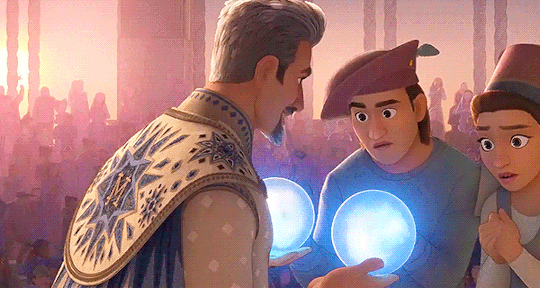
+As much as Magnifico was an awesome idea for a character and Chris Pine's performance was beyond entertaining, the movie did not always write him as well as they could've. From the very start, we see this guy is an egotistical control freak -- obsessed with his own image, incredibly hard-to-please, arrogant, vain, desperate for attention and unwavering praise and adoration from all of his subjects, and determined to keep an iron grip on everyone else's wishes because of the power it gives him. He's ALREADY a terrible person, from the start -- and yet the film tries to introduce this dark magic book that gets no explanation or backstory whatsoever and has no real characterization or presence, so it leaves no real impact on the audience corrupting him and making him a bad person, when it didn't need to! Magnifico was already the villain this film needed! Just let him fall head-first into madness without the book prompting anything! Even if Magnifico "lost everything" in the past, that doesn't make him a good person, if he takes everyone's wishes away from them and hoards them all to himself, only to grant a few now and again when it would make him look good.
+This above point actually leads nicely into one change I really, really wish the film had been ballsy enough to make -- have Asha already be Magnifico's apprentice, not trying to become it at the start of the story. Give our villain and hero a real relationship, with history that started before the events of this film! Asha lost her father at the age of 12...how interesting would it have been -- whether to make Magnifico more of an anti-villain or show how manipulative he really is -- if he'd tried to fill that fatherly role for our main character and twist her to serve his ends? What if At All Costs was rewritten to be about Magnifico not just being determined to hold onto all of the kingdom's wishes, but also this apprentice he sees as an extension of him and his legacy, while Asha is determined to protect this Star she's accidentally summoned and the suppressed wish of hers it represents? This change would've made Asha's break with Magnifico so much more powerful for both of them -- it would've both justified Magnifico's descent into madness and given Asha more reason to feel like it was her responsibility to stop Magnifico. You even could've then played more with Asha's relationship with Queen Amaya too, in this kind of a scenario.
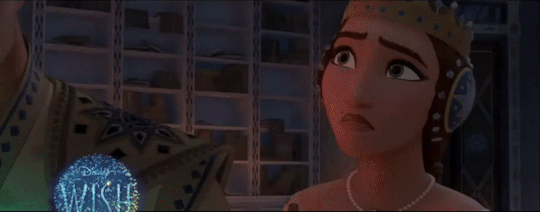
+Oh yeah, and on that note, Queen Amaya. OOH, this really annoyed me -- okay. So this woman is supposed to be a good guy, in this story. But as I touched on earlier, Magnifico was already a pretty awful person, hoarding people's wishes away in order to make himself powerful. Was Amaya truly so blind to that? Did she truly never question anything, ever? But no, really, she only turns on Magnifico after he starts using the dark magic book and actively threatens her. Only that makes her turn from him, and it's pretty damn immediate. Now okay, I hear you saying, it's like Amaya sings in Knowing What I Know Now, right? "The good in him, I've watched it melt // I was blinded by the love I felt"? Excuse me, lady -- but Magnifico wasn't a good person, before. He was just playing a part so as to stay powerful and adored by the masses. And if the story wants to claim otherwise, and act like that dark magic book was responsible for Magnifico going bad, then why would our Queen decide to keep him locked up in his staff's crystal forever? If the book was responsible, then Magnifico would be the Frodo or Golum to the book's One Ring -- he'd be a victim, in such a scenario: one in need of help and pity, not punishment. So either Amaya is a selfish person who only cared about her husband's mistreatment of others when it affected her, or she's a needlessly cruel person who decides to punish her husband for a vice that anyone could fall prey to. Either way, I don't want this woman ruling anyone! Make this woman a straight-up villain, same as her husband, and have the whole monarchy come crashing down after she and Magnifico both go down in flames! VIVE LA RESISTANCE! (Playing into my idea with Asha being Magnifico's apprentice all along, maybe there could even be a twist on the Evil Stepmother trope with Amaya, where she's jealous of how much Magnifico has tried to groom Asha as his apprentice, rather than spending time and/or starting a family with her or something.)
+As I touched on earlier, there wasn't even close to enough time to develop all of these characters properly. Since our heroine and friends are most similar to Snow White and her friends the Seven Dwarfs, let's compare cast size. Snow White is 83 minutes long and has a cast of ten (Snow, the Prince, the Queen, and the Dwarfs) -- Wish is 95 minutes long and has a cast of fourteen (Asha, Magnifico, Star, Valentino, Amaya, Asha's mum and grandpa, and our seven Friends). This results in us getting the vague idea that "Grumpy" role Gabo is sweet on our "Bashful" role Bazeema, but no time to develop their relationship or give it any kind of conclusion; the others saying "Sneezy" role Safi apparently loves the castle chickens with no sympathetic explanation why, to the point that he gets super excited about a chicken growing to a giant size for no real reason; "Doc" role Dahlia having a crush on Magnifico that is then dropped immediately after Asha turns against him; oldest kid and "Sleepy" role Simon feeling incomplete without the dream he gave Magnifico and "betraying" Asha as a result in an attempt to get it back, only to get stabbed in the back by Magnifico, and then have no time for a proper redemption after he's unhypnotized; Asha's grandfather turning on a dime about whether or not he wants to know what his wish was if Magnifico thought it was dangerous; Magnifico getting some justification in his backstory for his bad behavior, but Amaya's backstory being a complete black hole before she married Magnifico when you'd think it'd explain all the more why she stuck with him so long; and Asha's mum having her wish crushed to dust by Magnifico and then given back without us EVER LEARNING WHAT IT EVEN WAS IN THE FIRST PLACE, even after we see just about everyone else's wishes as soon as somebody picks it up and Asha's mum's wish gets picked up multiple times!! Come on, if you're going to set up NOT showing it, you may as well have a pay-off for it!! At least give us some moment where Asha's mum hugs her in relief and acknowledges that her daughter was her wish! That would've been a nice "aww" moment for everyone!
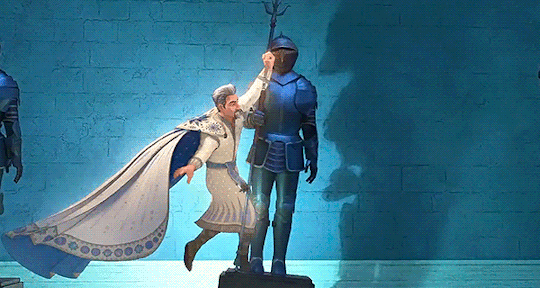
+Okay, I said I was going to talk about my problem with the songs, so here goes. As I said before, I listened to the soundtrack before watching the movie, and even when I did, I could immediately sense a problem: these songs did not tell me much of anything about the movie, just on their own. Welcome to Rosas, which is pretty much just an exposition dump about the kingdom and how Magnifico founded it, didn't really paint a picture of our setting or characters much at all, the way opening songs like Belle or The Family Madrigal do. This Wish, although pretty, was something I could hear just as easily on the radio -- it didn't feel as tied or necessary to understanding our heroine the way something like Part of That World does. I'm a Star, quite frankly, felt like a lot of inspirational word salad, rather than anything particularly memorable or revelatory -- why else wouldn't it even be worthy of a musical salute in the reprise, where Asha remembers that she and everyone else are stars during the climax? Even after reading summaries of the plot and spoilers from the storybook for this film, I could not figure out for the life of me how At All Costs would fit organically into such a story, being sung by our villain and hero. It wasn't until I saw the film that I saw how the filmmakers decided to fit it in and honestly...the song didn't help tell that particular scene at all. It's a really pretty song and I like it a lot -- but it lacked any of the irony or contrast that kind of a scene that introduces the difference in focus between our hero and villain required. If the scene itself is needed to understand what's supposed to be going on while the song is playing, then the song is not effectively telling the story and is therefore unnecessary. There wasn't even a particularly Spanish or Mediterranean flair to the soundtrack to help set the stage, aside from the occasional flourish of castanets -- instead it sounded very contemporary, which I guess is appropriate, since it was largely written by pop composers rather than any musical theater talent.
+There were also points where the songs felt the urge to shove in a bunch of extra words just because, rather than have the words flow well and really mean something. I'm a Star is most guilty of this, of course, but even in This is the Thanks I Get?, we hear Magnifico gripe that "I let you live here for free and I don't even charge you rent" -- mate, THAT MEANS THE SAME THING! If you live somewhere for free, then you are NOT paying rent!
+Knowing What I Know Now is a bop and I like it (aside from Amaya's stupidity), but I'm sorry, all I can think when I hear it is "This is clearly trying to be Ready as I'll Ever Be from Tangled the Animated Series, but that song blows this out of the water." However fun the song can be, it would've been so much stronger if it actually addressed the contrast between the characters and revved us up for a big final battle, instead of it just being our eight underdeveloped characters psyching each other up.
+The idea of everyone being stars was a lovely idea, but the execution of Asha remembering this fact and using it to defeat Magnifico was terribly handled. First off, there was no revelatory phrase or action that prompted Asha to remember this fact, so her suddenly saying that "they're all stars" came out of nowhere. Second, even putting aside that there'd be no way any of her friends could hear Asha from all the way up on the tower if they're stuck in the courtyard below, there's no reason I can see for Asha's friends or family to know what the hell she was even TALKING about. They weren't there when the I'm a Star number happened! And the way that number made it seem, just based on the visuals, it looked like the "star" power came from a person's dream, since it's the same glow that returns to Asha's grandfather when he gets his dream back, but most of the town's dreams have been already yanked out by Magnifico at this point! I think the idea is that since everyone is a star, even with that big piece of them and the power accompanying it taken out, they still have enough stardust inside of them to be powerful enough to chase their heart's desires...but yeah, I'm sorry, for all the word salad I'm a Star threw around, this world-building aspect was really not made clear, and because of that and the lack of a proper callback to this plot turn, the climax didn't hit as strong as it should've.
Overall, this film felt a lot like a batch of unbaked chocolate chip cookies that someone decided to throw a bunch of brightly colored sprinkles on top of, just because they could. A lot of ideas just don't feel like they were fully developed, and there was a lot tossed in that didn't contribute to the overall taste or bring the disparate elements together in a cohesive whole, instead feeling more like a distraction than anything of actual substance. That doesn't mean I couldn't eat it -- I like eating cookie dough as much as the next person -- but that doesn't mean it felt like a complete, finished product worthy of great praise. Instead I'm left looking at the wasted potential and wishing the movie had carved out its own path more, one distinctive to itself, rather than just be a mashup of previous Disney concepts and tropes. I won't act like there's nothing to like here, nor that it's completely lacking in heart: I actually would love to see fandom for this movie re-imagine it in ways that could've improved the story and characters, because there were SO many good ideas here...but for me personally, this movie left me colder than it should've and -- like Asha after meeting Magnifico -- a bit disappointed.
So I make this wish...to have Disney make a film better than this.
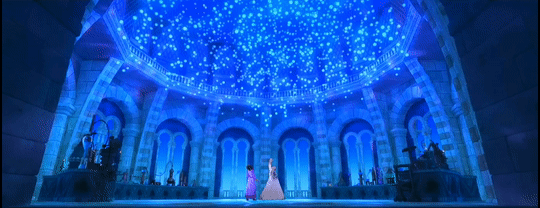
Overall Grade: C-
76 notes
·
View notes
Note
What's your opinion on Wes Anderson's movies and how he uses orientialism?
there are people far more more knowledgeable on this topic than me (here and here are articles on this written by Asian critics) so take anything i say about it with a grain of salt! I do love Moonrise Kingdom, Fantastic Mr Fox and the Life Aquatic because they inspired me loads as a writer growing up. I think that Wes Anderson has somewhat acknowledged the influence of South Asian cinema on his work, like when he dedicated Darjeeling Limited to Bengali director Satyajit Ray, BUT it doesn't really excuse his orientalism, racism and appropriation of various Asian aesthetics in films like Isle of Dogs, grand Budapest hotel, and The Life of Henry Sugar. It's clear he views non white cultures as merely another ingredient he can add to his films to make them more quirky. I haven't seen all his films, but I was uncomfortable at the way he framed characters of colour in gbh and the french dispatch. There's rarely, if ever, any real thought to the roles he casts people of colour in and they're mostly treated as accessories to white characters. That being said, I still admire his craft and think his films are strongest when he remembers how his stylising enhances story, rather than aestheticising for its own sake. I've even written an article about how much I hate people bastardising his style on TikTok because it's such a vain treatment of his work. But ultimately I do take issue with the racism and orientalism in his filmography, and think he serves as a reminder that being influenced by filmmakers of colour isn't a get out of racism free card and I think his films are strongest when they're just about sad sily white people.
30 notes
·
View notes
Text
I saw a post that was asking why Talokan is named after the Aztec underworld paradise Tlālōcān when the Talokanil are Mayan. I was pleasantly surprised by the backstory given by one of the film’s cultural consultants, Dr. Gerardo Aldana, on this week’s episode of the Wakanda Forever podcast (which is excellent btw). He makes the distinction that they came up with Talokan as a Maya pronunciation of Tlālōcān, and that Tenoch’s input was crucial to finalizing the backstory:
“Ryan comes to me and he says ‘Hey, Tenoch says he doesn’t look totally Mayan, so can he possibly be mixed? Can he be mixed indigenous?’ And I said that’s perfect, because if Tenoch’s father’s family is pochteca, that means there’s these mercenary spies from the Aztec empire, and they come out, and they live in Yucatán, and then his mom is Mayan, so he’s like this mixed indigenous race, and then it gets even better because once they go into the underworld...and Namor’s like, ‘Hey I want to know more about my dad, I want to know about his community,’ she’s telling him all these stories about what he [Namor’s father] would tell her, and he talks about Tlālōcān, which becomes Talokan. So then you end up with the final name: he’s inspired by this father that he never knew, this paradise in the underworld, and that becomes the name of what he wants to build.”
I'm so moved by the idea of Namor’s love for his people being influenced by his love and grief for both of his parents—and his vision for Talokan being influenced by both parts of his heritage. Also appreciated that, on the podcast, Tenoch made a point of clarifying 1) the film’s imagining of a pre-Hispanic Maya community is distinct from current indigenous communities and the oppression they face, and 2) he’s not indigenous so “that doesn’t mean that the current indigenous and the mixed people in Latin America can feel represented” (though they can possibly feel connected).
I def don’t think the movie is perfect and I defer to how indigenous folks of Latin America feel about the incorporation of Mayan culture. But I have a lot of admiration for how thoughtful every member of the team seems to have been in approaching it, and the specific generosity of Black filmmakers including non-Black indigenous people in an Afrofuturist project. Other episodes of the podcast highlight the immense amount of research and work that Hannah Beachler and Ruth E. Carter conducted in creating the visual world of Talokan—and their determination, along with Ryan Coogler’s, to do it with respect for the people and culture and understanding of the stakes—and imo it really shows.
249 notes
·
View notes